On October 19, 2023, the“International Forum on People-to-People Exchange and Launch Ceremony of the Global People-to-People ExchangeSeason of Peking University” was officially launched at the Qiulin Lecture Hall of the School of International Studies, Peking University. The Forum was hosted by Peking University, co-organized by the Institute for Global Cooperation and Understanding (iGCU), the School of International Studies (SIS), and the Office of International Relations, with support from the Shanghai International Studies University, Xiamen University, and Sichuan University. Senior practitioners, leading scholars, and professionals from thirteen institutions across nine countries attended the Forum.
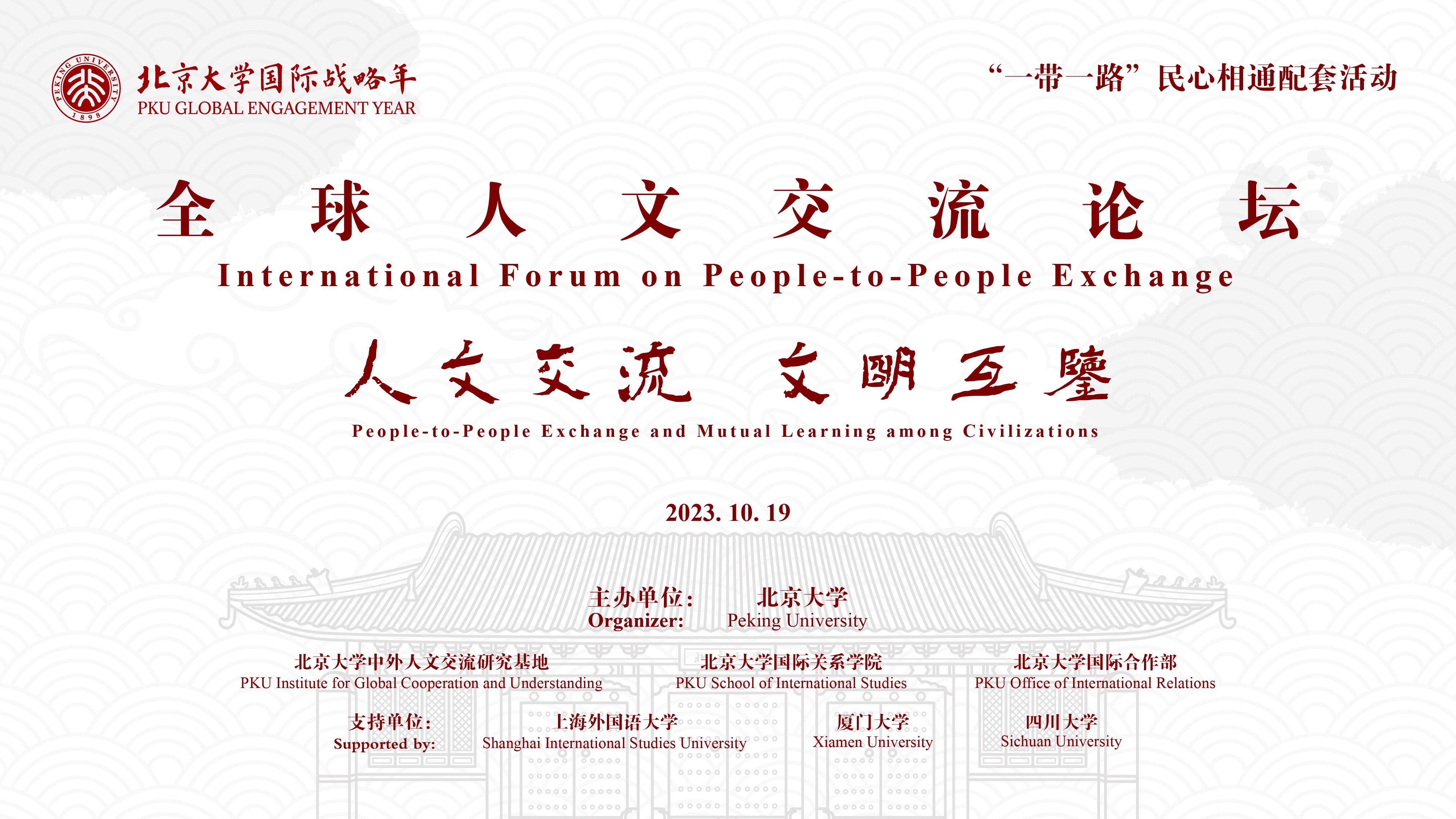
- Opening Ceremony -
Prof. GONG Qihuang (President of Peking University) attended the opening ceremony. Mr. ZHAO Lingshan (Vice Chairman and Secretary General of the Chinese International Education Foundation) and Prof. WANG Bo (Vice President and Provost of Peking University) delivered opening remarks respectively. Prof. JIA Qingguo (Member of the Standing Committee of the CPPCC National Committee, Professor at SIS, Director of iGCU) moderated the opening ceremony.
Mr. ZHAO Lingshan (Vice Chairman and Secretary General of the Chinese International Education Foundation) provided a comprehensive overview of the educational journey, distinctive features, and significant importance of the brand project, the Confucius Institute, in the context of cross-cultural people-to-people exchange. Mr. Zhao Lingshan emphasized that the Confucius Institute has established its credibility through high-quality Chinese language instruction, cultivating a warm environment of multicultural fusion and a deep sense of responsibility in promoting cross-cultural understanding. By fostering collaborative partnerships with international counterparts and employing a "discussion, construction, and sharing" approach, the Confucius Institute has achieved a milestone in the history of global people-to-people exchange. The foundation's fundamental principles are rooted in starting with language, merging cultures, and facilitating people-to-people connections. The shared values they aim to promote include peace, development, equity, and justice, making a remarkable contribution to cross-cultural human exchange between China and the world.
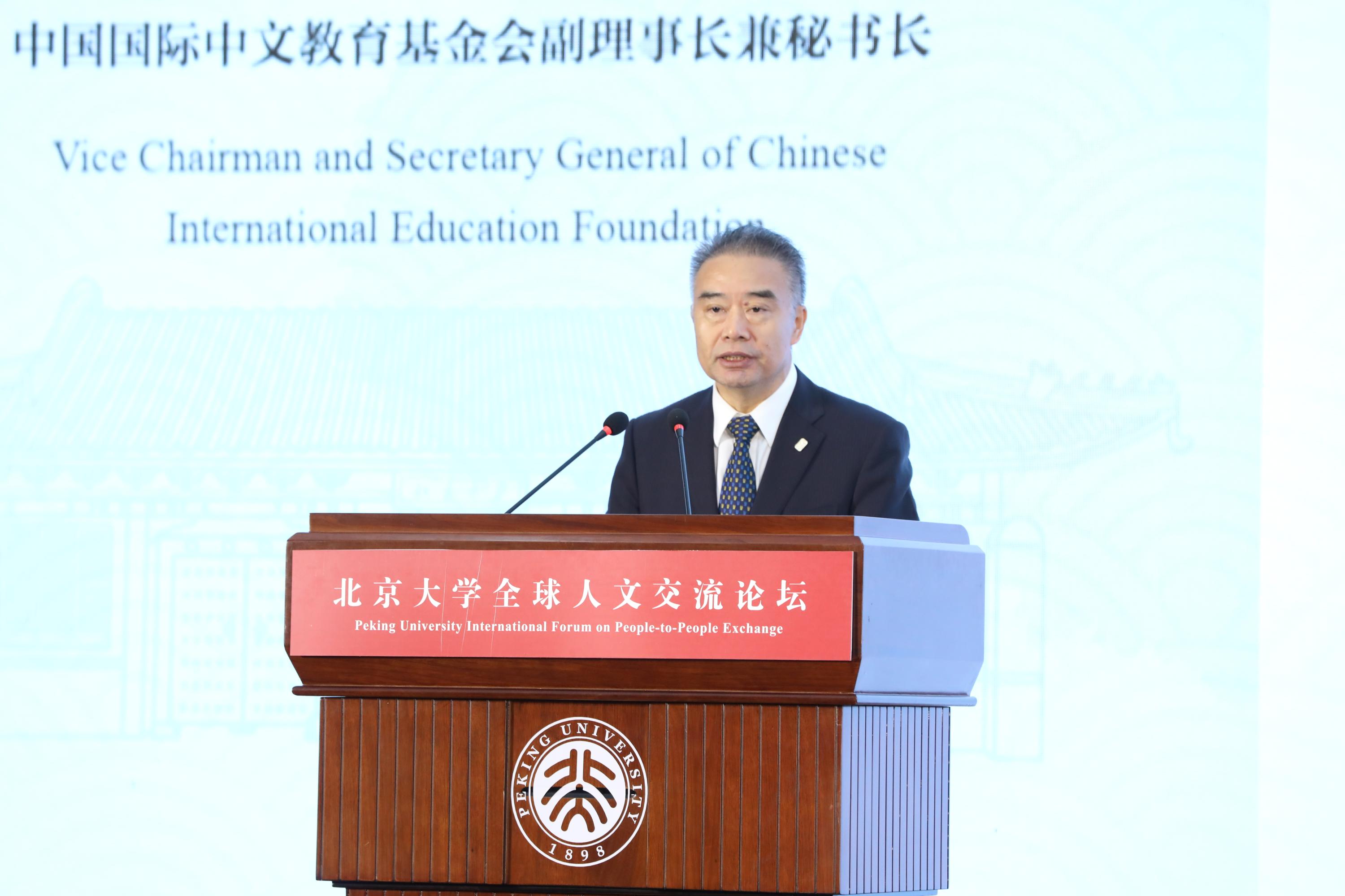
Mr. ZHAO Lingshan, Vice Chairman and Secretary General of the Chinese International Education Foundation
Prof. WANG Bo (Vice President and Provost of Peking University) noted that the international community is currently facing various global challenges. He underscored that China's "Three Initiatives"(Global Security Initiative; Global Development Initiative; Global Civilization Initiative)present a shared vision for humanity to confront the crises of our time and promote global prosperity. Prof. Wang highlighted that cultural exchange and mutual learning are fundamental requirements for the development of civilizations, and Peking University has achieved significant accomplishments in promoting cross-cultural exchanges and mutual cultural enrichment. Prof. Wang also announced Peking University's designation of 2023 as the year of Global Engagement. The university remains committed to its mission of "bridging cultures and understanding the world," aiming to contribute the wisdom and strength of Peking University to global initiatives in higher education, think tanks, and other areas of people-to-people exchange and cross-cultural learning.
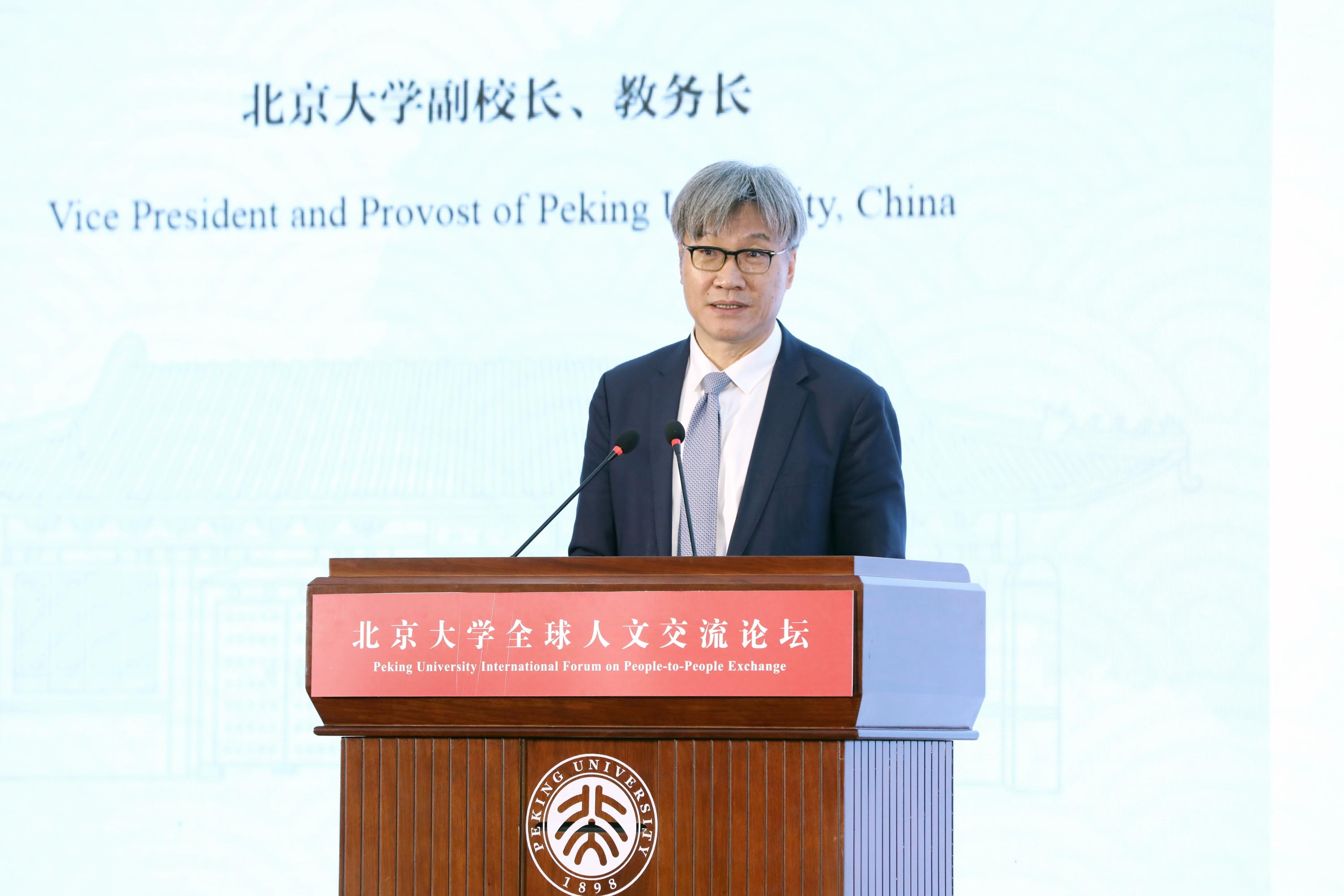
Prof. WANG Bo, Vice President and Provost of Peking University
- Release of the 'Global People-to-People Exchange Index Report' -
Following the opening remarks delivered by Mr. Zhao Lingshan and Prof. Wang Bo, the 'Global People-to-People Exchange Index Report' was officially released. Dr. QI Haotian (Assistant Professor at SIS and Secretary-General of iGCU) introduced the major contents of the report: the background and significance of this endeavor, the design principles of the index, the calculation methods and procedures, data collection and processing, the database and retrieval system, and initial research outcomes from the data analysis and visualization platforms. Furthermore, Dr. Qi emphasized an interdisciplinary nature, drawing from international relations, humanities studies, and information science. The primary objective behind creating this index is to foster a scientific understanding of the interconnectedness of people's sentiments and to address the complex international issues of our time. This initiative seeks to enhance the stable development of multidimensional bilateral and multilateral relationships; thus, strengthening the foundation for the effective governance of international public domain issues. Additionally, it is of paramount importance to better grasp, theoretically and empirically, the impact of cultural and humanities exchanges on the relations between nations and civilizations. Academic research in this area is scanty; hence, the need for further research. The construction of the index system marks the first step in employing scientific methodologies within the relevant domains. This report represents an interim achievement in the global People-to-People Exchange Index project, with the long-term goal of establishing and refining an index that offers a comprehensive, multi-dimensional, and intelligent assessment of the state and dynamics of global cross-cultural exchanges.
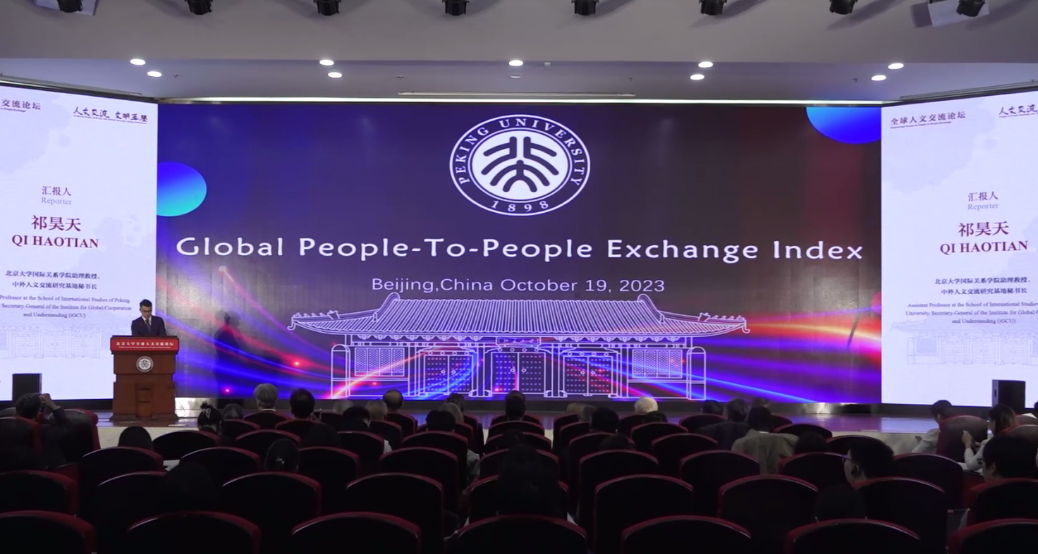
Dr. QI Haotian, Assistant Professor at SIS and Secretary-General of iGCU
- Launch Ceremony -
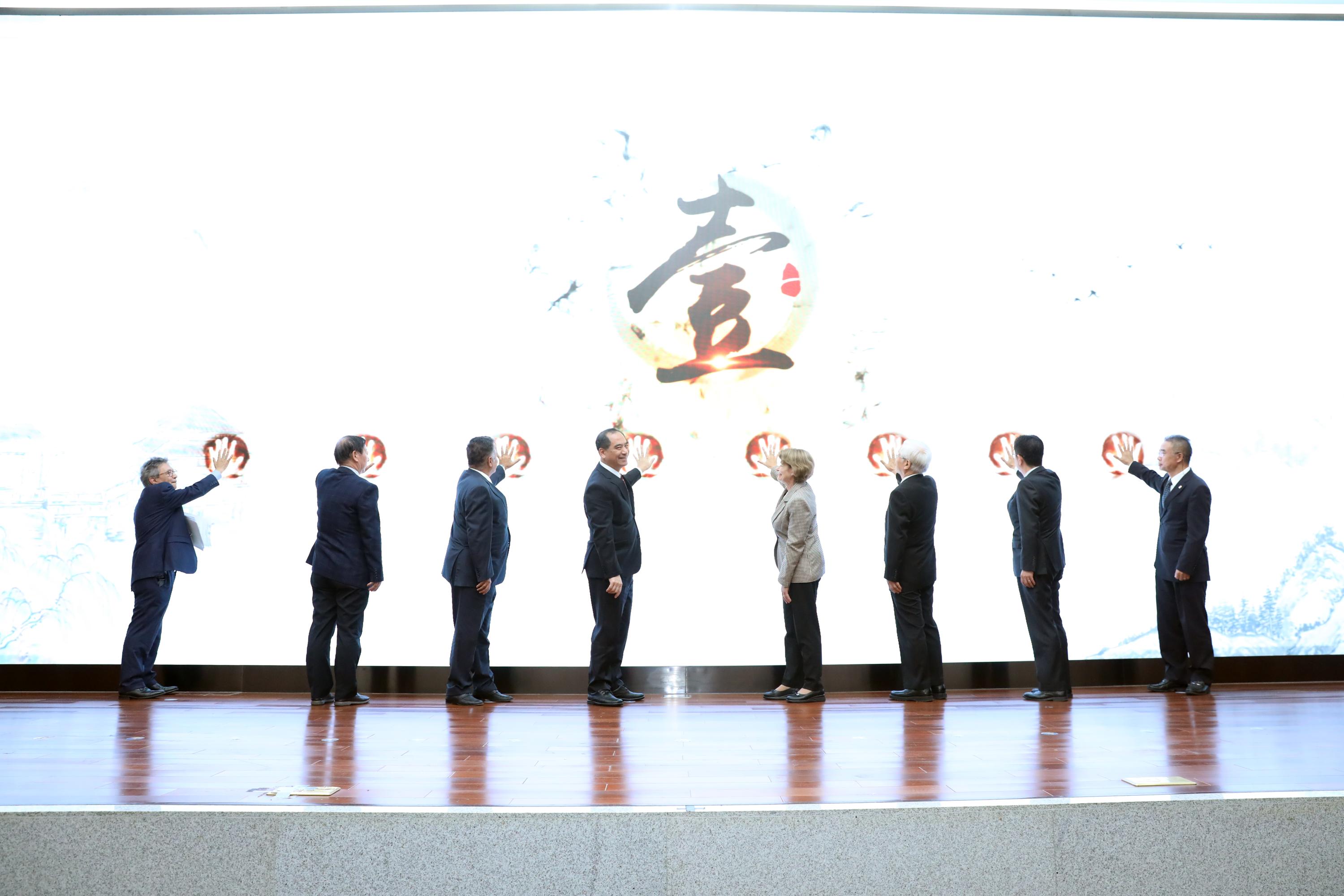
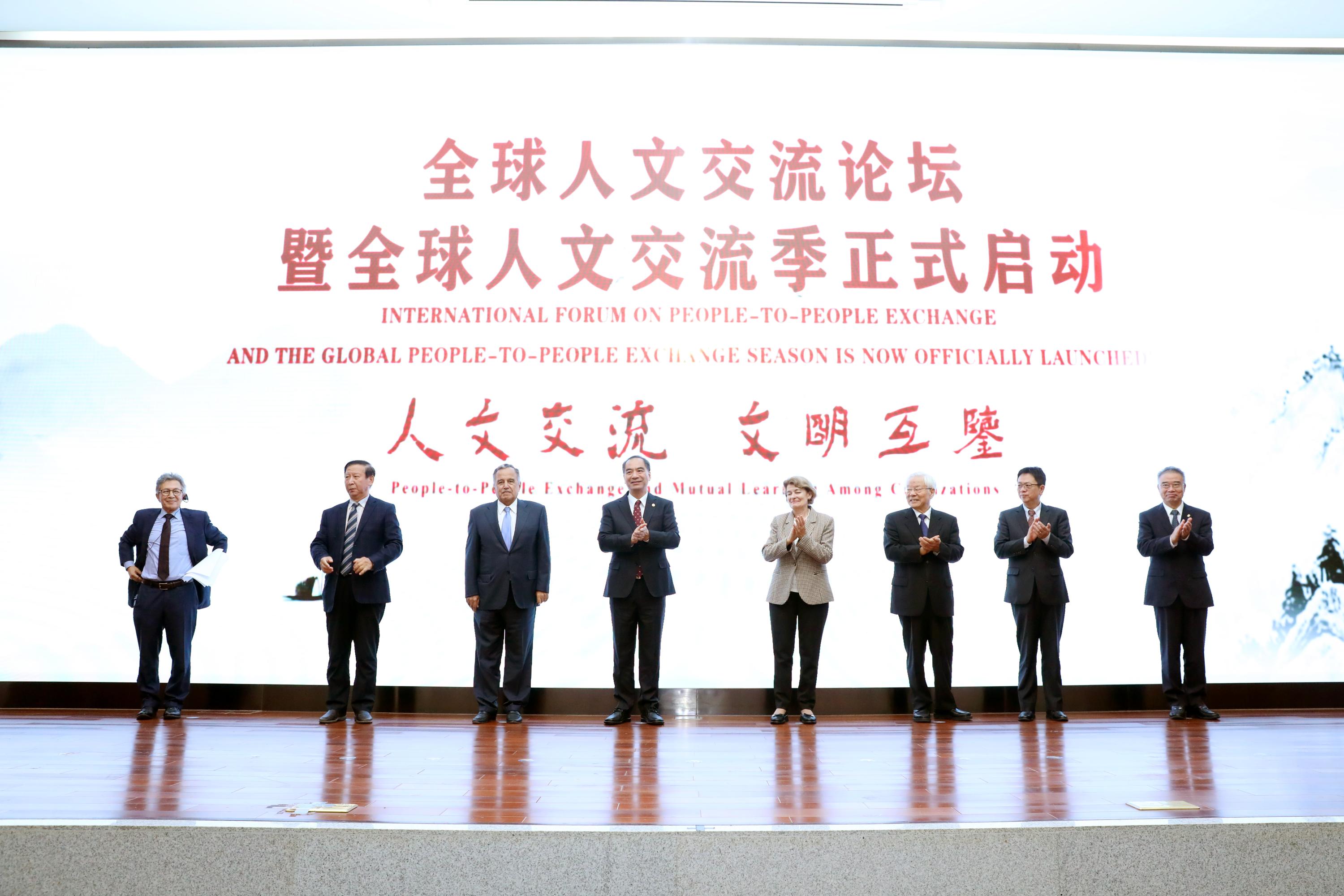
Distinguished guests announced the official launch of the International Forum on People-to-People Exchange and the Global People-to-People Exchange Season of PKU. From Left to Right is Prof. Houssine Azeddoug (President of Hassan II University of Casablanca), Mr. YU Hongjun (former Vice Minister of the International Department of the CPC Central Committee), Mr. Nabil Fahmy (former Foreign Minister of Egypt), Prof. GONG Qihuang (President of Peking University), Ms. Irina Bokova (former Director-General of the UNESCO), Mr. CAI Wu (former Secretary of the Party Group & Minister of the Ministry of Culture of the PRC), Prof. LI Yansong (President of Shanghai Int'l Studies University), and Mr. ZHAO Lingshan (Vice Chairman and Secretary General of Chinese International Education Foundation)
- Keynote Speeches -
Following the official launch ceremony, Mr. Abhisit Vejjajiva (former Prime Minister of Thailand), Mr. CAI Wu (former Secretary of the Party Group and Minister of the Ministry of Culture of the PRC), Mr. Nabil Fahmy (former Foreign Minister of Egypt), Mr. YU Hongjun (former Vice Minister of the International Department of the CPC Central Committee), and Ms. Irina Bokova (former Director-General of UNESCO), delivered keynote speeches respectively.
In the speech of Mr. Abhisit Vejjajiva (former Prime Minister of Thailand), he stated that the Forum and dialogues series initiated by Peking University are very important and timely given the rise of geopolitical tensions. He stressed that safeguarding global peace and attaining common prosperity for all requires every country to collaborate, build mutual trust with one another, and enhance mutual understanding among civilizations. He reckons that civilizations have much more in common than differences, as we all share "common aspirations of having a good life, and living in a peaceful and prosperous world with basic rights and respect." Only through more frequent exchanges can mutual understanding be created and global peace and common prosperity for the future be achieved. Mr. Vejjajiva accentuated the significant role of cultural, educational, and people-to-people exchanges, stating that those exchanges have the most power to bring people together (especially if the youth worldwide could be brought together through exchanges). Quoting Mr. Vejjajiva, "As we become more familiar with those who come from different backgrounds, we overcome suspicion and fear, and we replace that with trust and understanding and appreciate the shared destiny that we have."
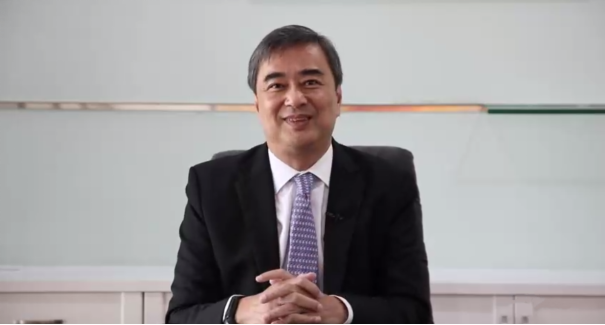
Mr. Abhisit Vejjajiva, former Prime Minister of Thailand (In Pre-recorded Video)
Following the speech of Mr. Vejjajiva, Mr. CAI Wu (former Secretary of the Party Group and Minister of the Ministry of Culture of the PRC) shared his personal experiences and observations about cultural and people-to-people exchanges between China and other countries. Mr. Cai started off his speech by mentioning the significance of the "Global Civilization Initiative" (GCI), noting that the core tenets of the GCI's “four advocacies” serve as the logical foundation and core connotation of China's efforts to promote global people-to-people exchange. Mr. Cai stressed that in our attempt to strengthen international people-to-people exchange and cooperation, it is always vital to advocate respect for the diversity of civilizations, embrace and promote the universal values of humanity, and attach importance to the inheritance and innovation of civilizations. Moreover, Mr. Cai discussed the significant roles that higher education institutions and universities play in promoting international people-to-people exchange. He believes that universities should take the responsibility to facilitate the formulation of open and inclusive international cooperation mechanisms, initiatives, and policies, and promote mutual understanding and affinity among people from all countries. These efforts would contribute to the construction of a community with a shared future for humankind.
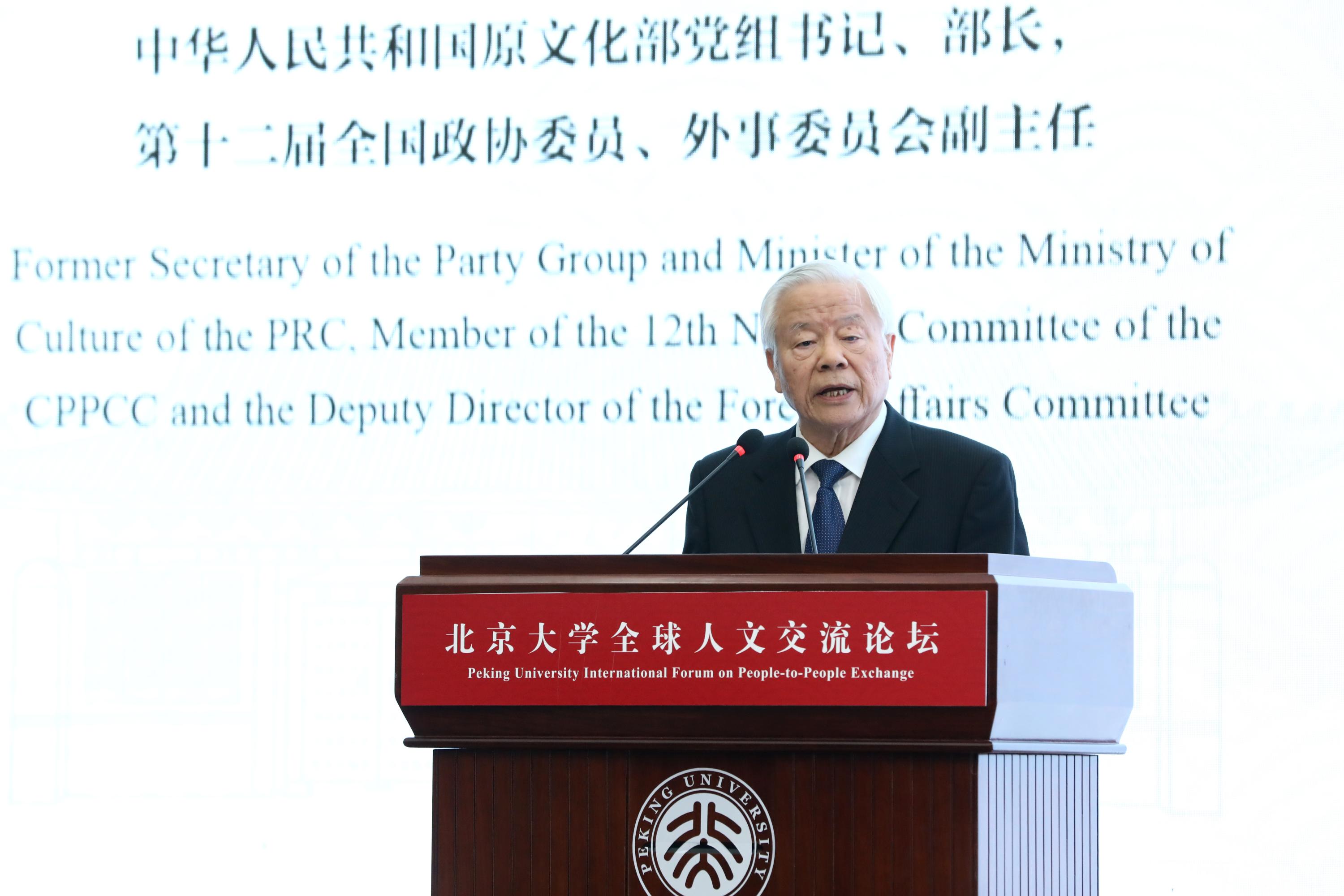
Mr. CAI Wu, former Secretary of the Party Group and Minister of the Ministry of Culture of the PRC
Mr. Nabil Fahmy (former Foreign Minister of Egypt) stated in his speech that where interaction occurs, a greater understanding of the other person/group exists. He believes isolationism is not and will not be an option for anyone, nor a lack of understanding of other civilizations or peoples, except at one's own risk. He highlighted the imperativeness of tolerance, understanding, and cooperation, over choices. Talking about the "Global Civilization Initiative" (GCI), Mr. Fahmy highly commended the GCI for how it injects fresh and strong energy into the common development and progress of human society, particularly in these turbulent and dynamic times. Mentioning the Belt and Road Summit convened in Beijing on October 17 and 18, 2023, Mr. Fahmy reckons that it was an auspicious opportunity provided for in-depth discussions between world leaders on how to move forward (in this challenging time), including discussion about ways to better strengthen people-to-people ties between countries. Sino-Egyptian people-to-people exchange, as Mr. Fahmy noted, is reaching its climax, and he would continue to work to promote understanding between China-Egypt civilizations.
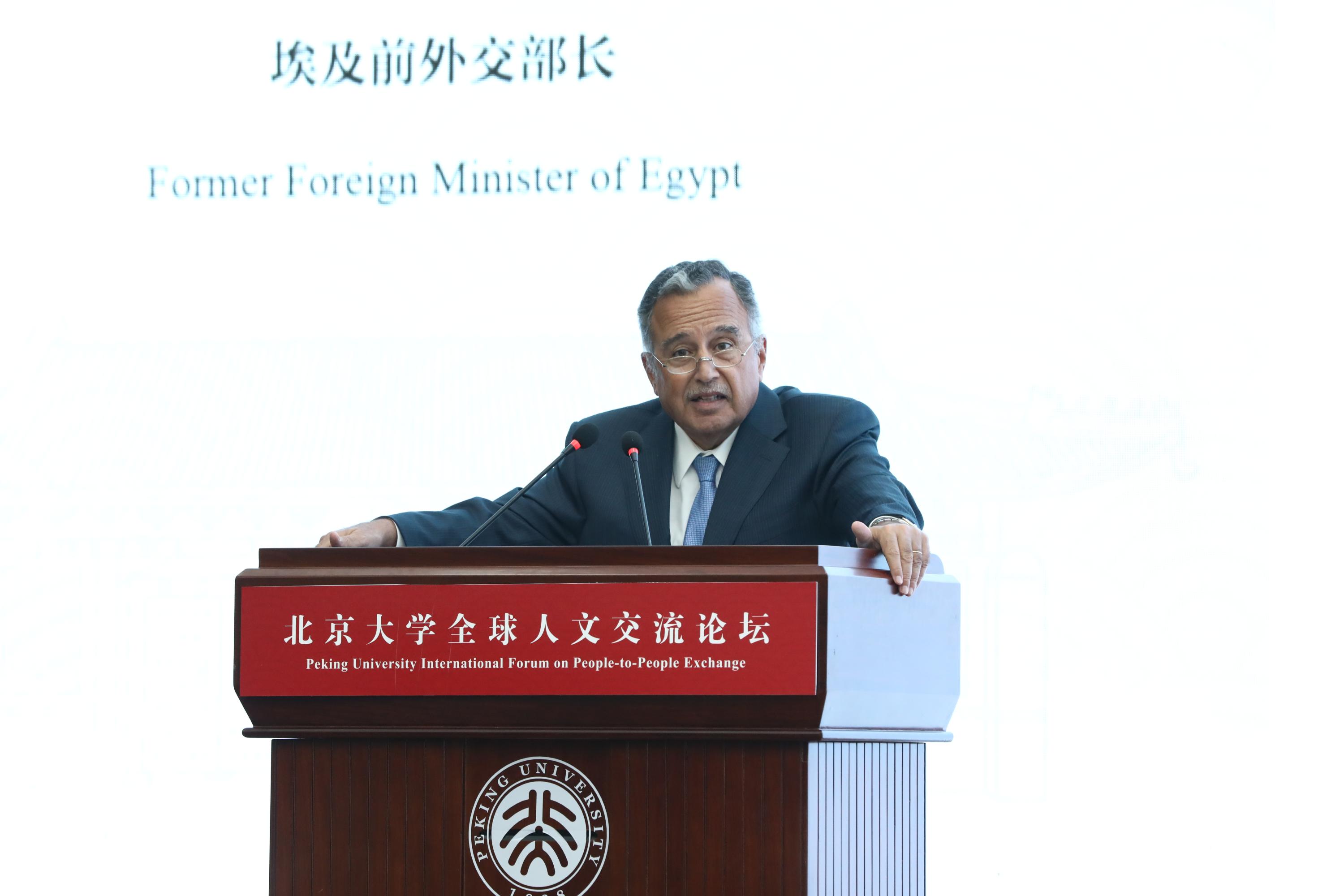
Mr. Nabil Fahmy, former Foreign Minister of Egypt
Mr. YU Hongjun (former Vice Minister of the International Department of the CPC Central Committee) pointed out that as an important aspect of the "Belt and Road Initiative" (BRI), people-to-people exchange and cooperation have become a critical platform to promote mutual learning among countries worldwide and facilitate interconnection of human civilizations. Guided by the concept of “Building a Community with a Shared Future for Mankind,“ China has actively carried out a series of all-round and in-depth people-to-people exchanges and cooperation programs and projects. These have been aimed at enhancing policy coordination and strengthening people-to-people ties among the BRI countries and other countries across the globe. Mr. Yu noted that as humanity faces a complex and ever-changing external environment, it is essential to further advance the existing people-to-people exchange mechanism, and improve international cooperation. Mr. Yu also suggested that it would be conducive to fully involve the state, government, and society to draw on traditional experiences and methods, and modern tools and means. This process also involves injecting elements of culture, technology, rule of law, politics, economy, and security into our future endeavor to promote people-to-people exchange.
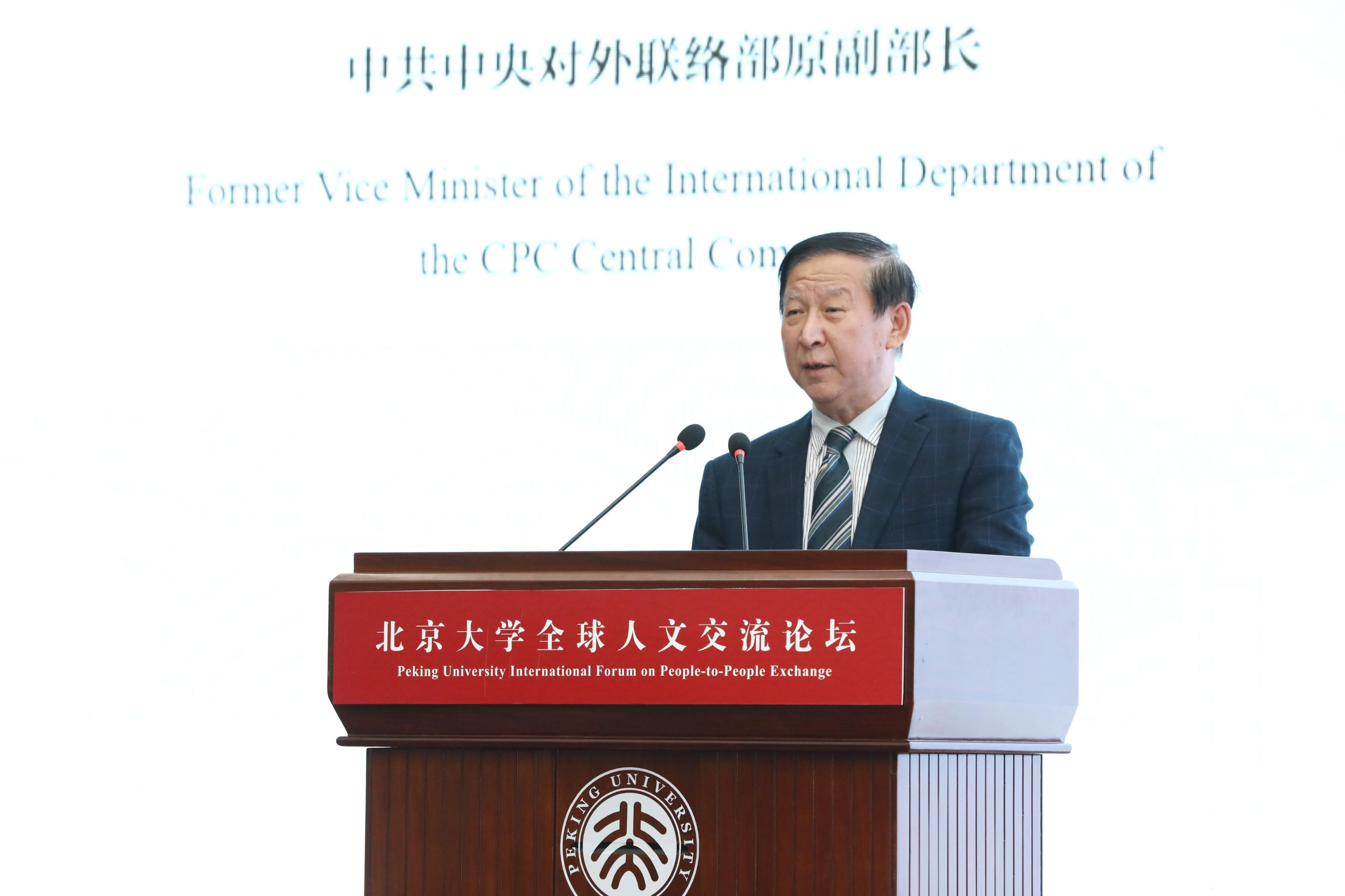
Mr. YU Hongjun, former Vice Minister of the International Department of the CPC Central Committee
Mr. Irina Bokova (former Director-General of UNESCO) stressed that people-to-people exchange constitutes a key part of the “eight major steps” to support the joint pursuit of high-quality Belt and Road cooperation, proposed Chinese President Xi Jinping at the Third Belt and Road Forum for International Cooperation. She indicated that many similarities exist between the United Nations '2030 Sustainable Development Goals and China's Belt and Road Initiative. Both initiatives strive to achieve infrastructure connectivity and people-to-people ties among different countries and regions. Ms. Bokova also highlighted the ever-increasingly essential roles played by universities in achieving sustainable development goals, providing inclusive and equal educational opportunities, and cultivating new young people with independent thinking, adapting to cross-cultural communication and globalization.
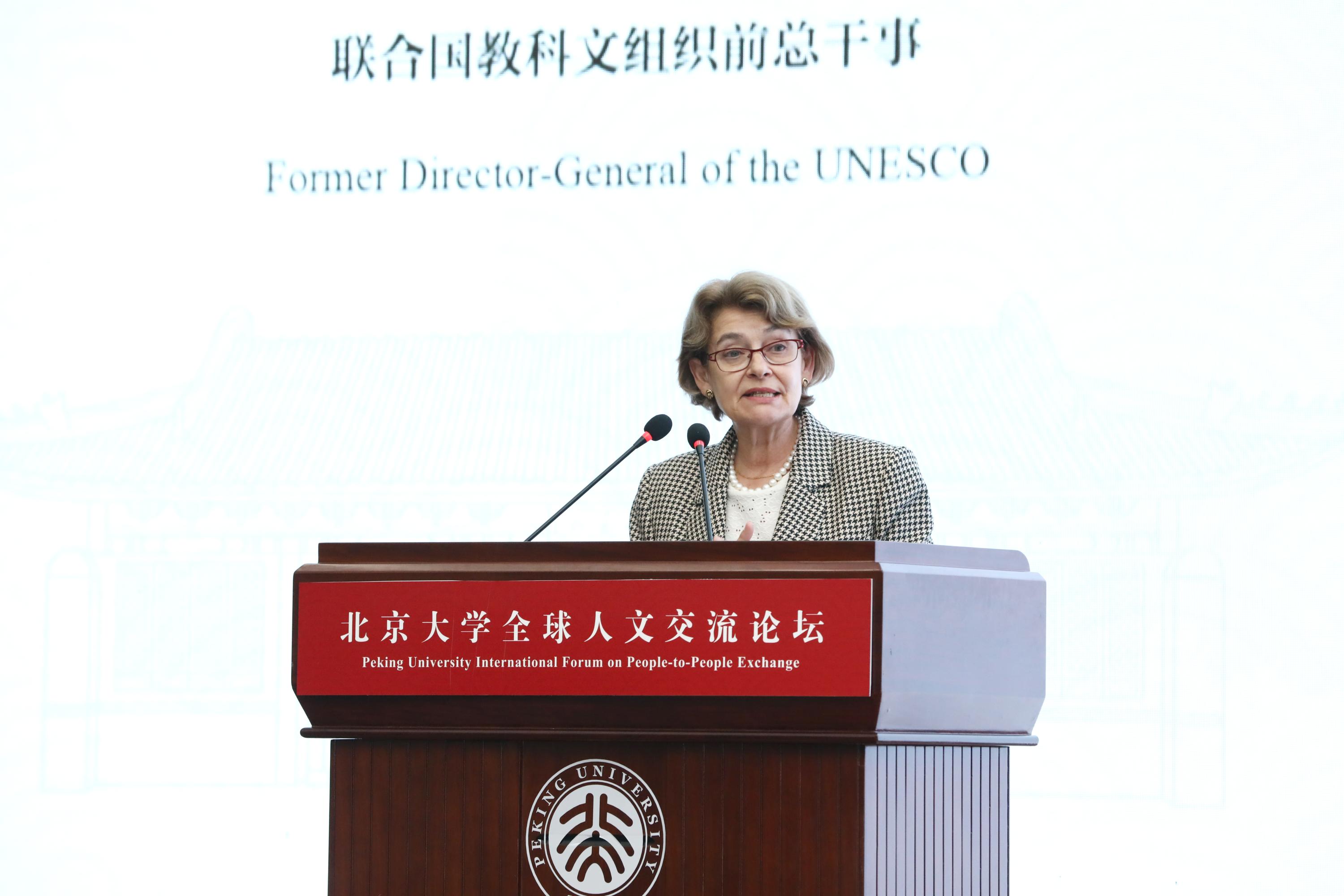
Ms. Irina Bokova, former Director-General of the UNESCO
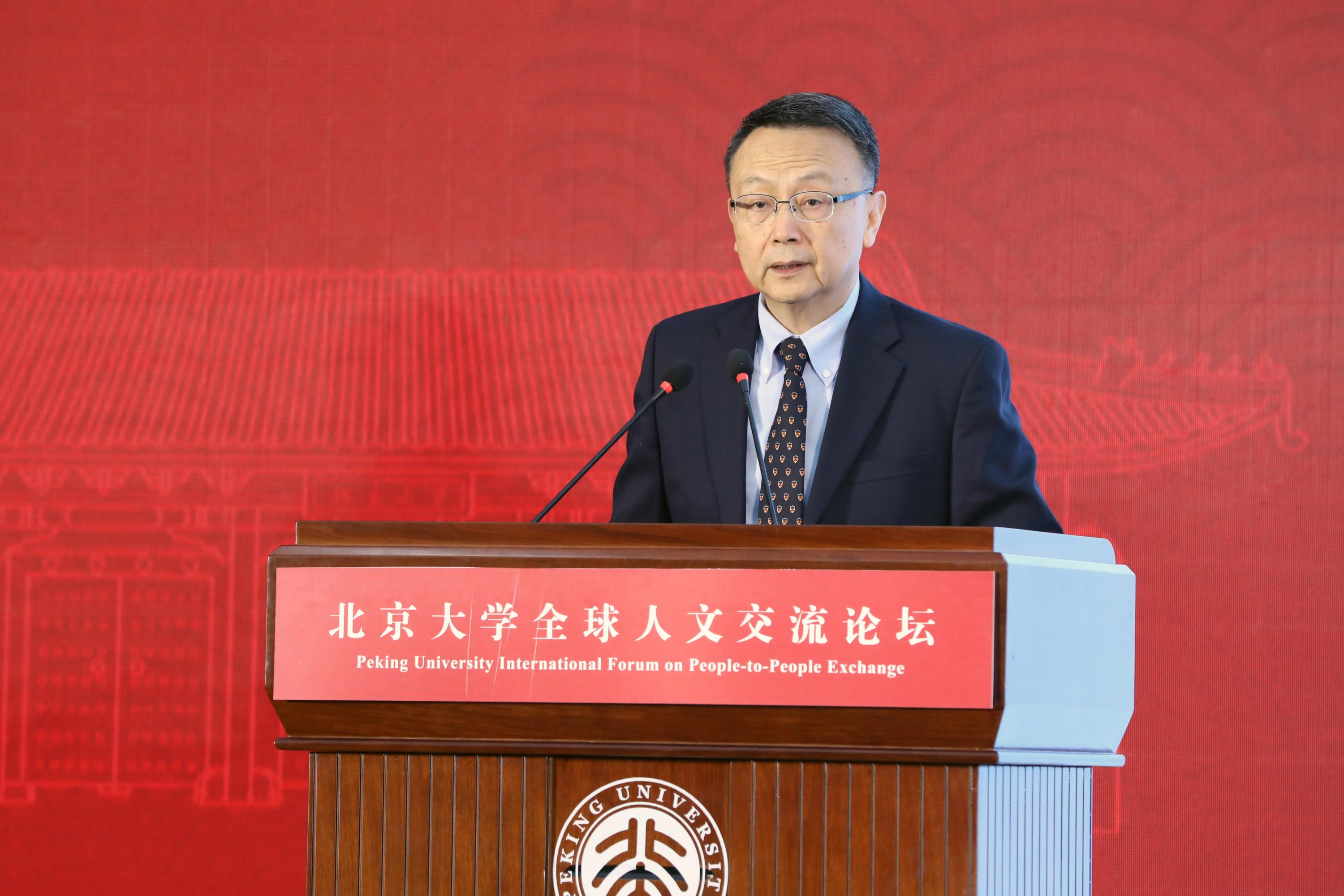
Prof. JIA Qingguo, Member of the Standing Committee of the CPPCC National Committee, Professor at SIS, Director of iGCU
- Presidents Roundtable Discussion -
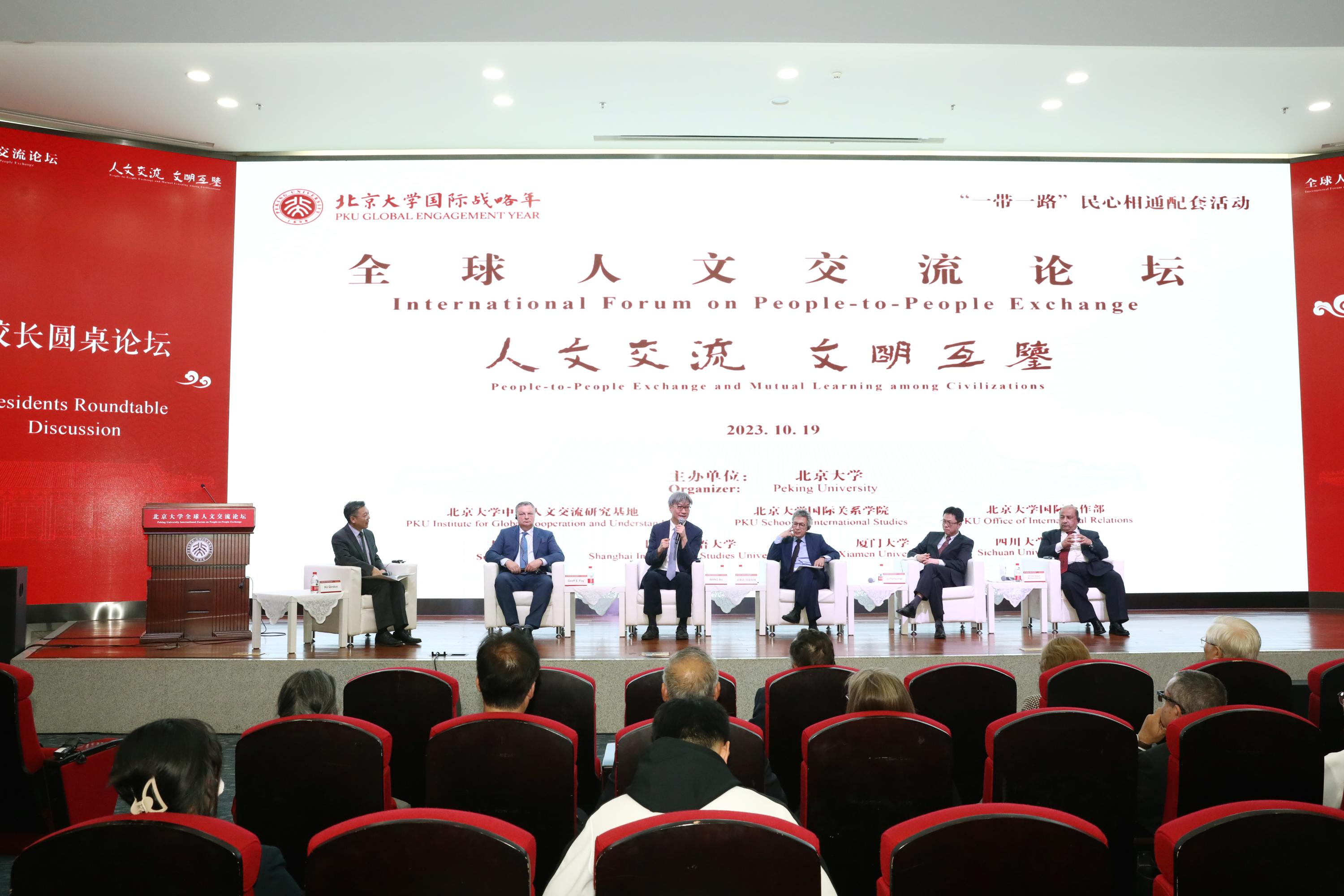
The Presidents Roundtable Discussion session was moderated by Mr. XU Qinduo (Anchor of CGTN). Prof. Houssine Azeddoug (President of Hassan II University of Casablanca, Morocco), Prof. LI Yansong (President of Shanghai International Studies University), Prof. Ahmed Ragab MuhammadAli (Vice President for Student Affairs of Cairo University, Egypt), Prof. WANG Bo (Vice President and Provost of Peking University, China), and Dr. Geoff E. Foy (Associate Provost for Graduate Programs and Continuing Education at Pacific Lutheran University, U.S.) participated in the session, exchanging their viewpoints on "People-to-peopleExchange and Mutual LearningamongCivilizations".
Discussing his experience in trans-national scientific research, Prof. Houssine Azeddoug (President of Hassan II the University of Casablanca, Morocco) suggested that the close cooperative relationship between China and Morocco has been reflected in many aspects of bilateral exchanges. Through the Belt and Road Initiative, the two countries are now even better connected than before. He further noted that the evolving transnational cooperation has transcended geographical location and politics, stressing that more attention has been, and should be paid, to enhancing people-to-people exchanges and global cooperation. Prof. Azeddoug further proposed that scholars worldwide should all be encouraged to actively participate in cross-border academic exchanges and facilitate cooperation in several domains, including public health hygiene, environment protection, and water shortage. During the discussion session, Prof. Azeddougalso shared the experiences of Hassan II University of Casablanca and Shanghai International Studies University in cross-cultural people-to-people exchange, presenting his keen anticipation for future people-to-people exchanges between the two universities as well as the two countries.
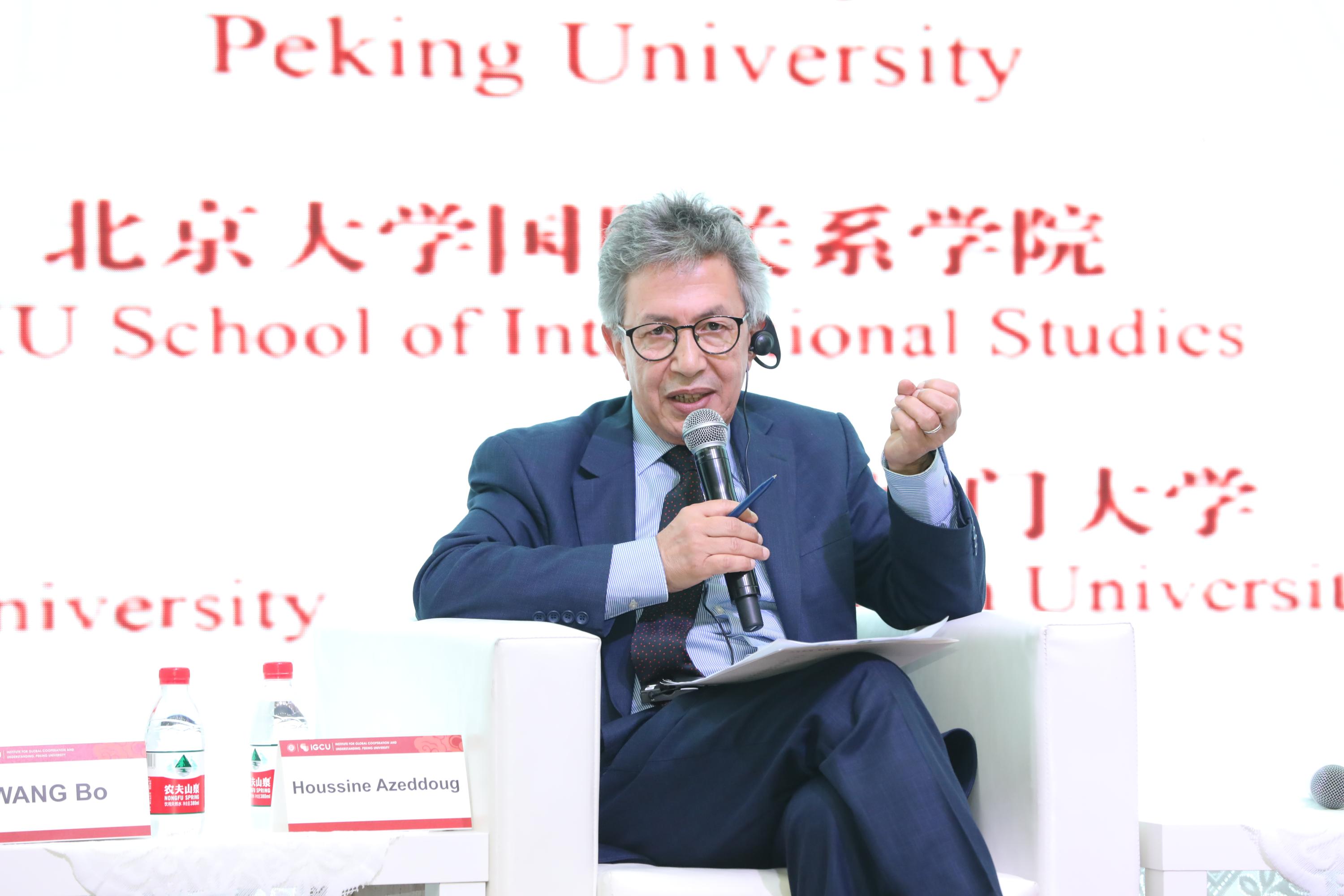
Prof. Houssine Azeddoug, President of Hassan II University of Casablanca, Morocco
Prof. LI Yansong (President of Shanghai International Studies University) first introduced the vision and distinctive characteristics of Shanghai International Studies University (SISU). He then shared with the audiences SISU's experiences and works to promote international people-to-people exchanges. Prof. Li stressed the necessity to give young students study abroad opportunities to understand cultures that are different from theirs. He stated that given the diversity of world civilizations and cultures, the prospect of living in a more beautiful, healthy, and harmonious world hinges upon learning from and complementing one another's deficiencies.
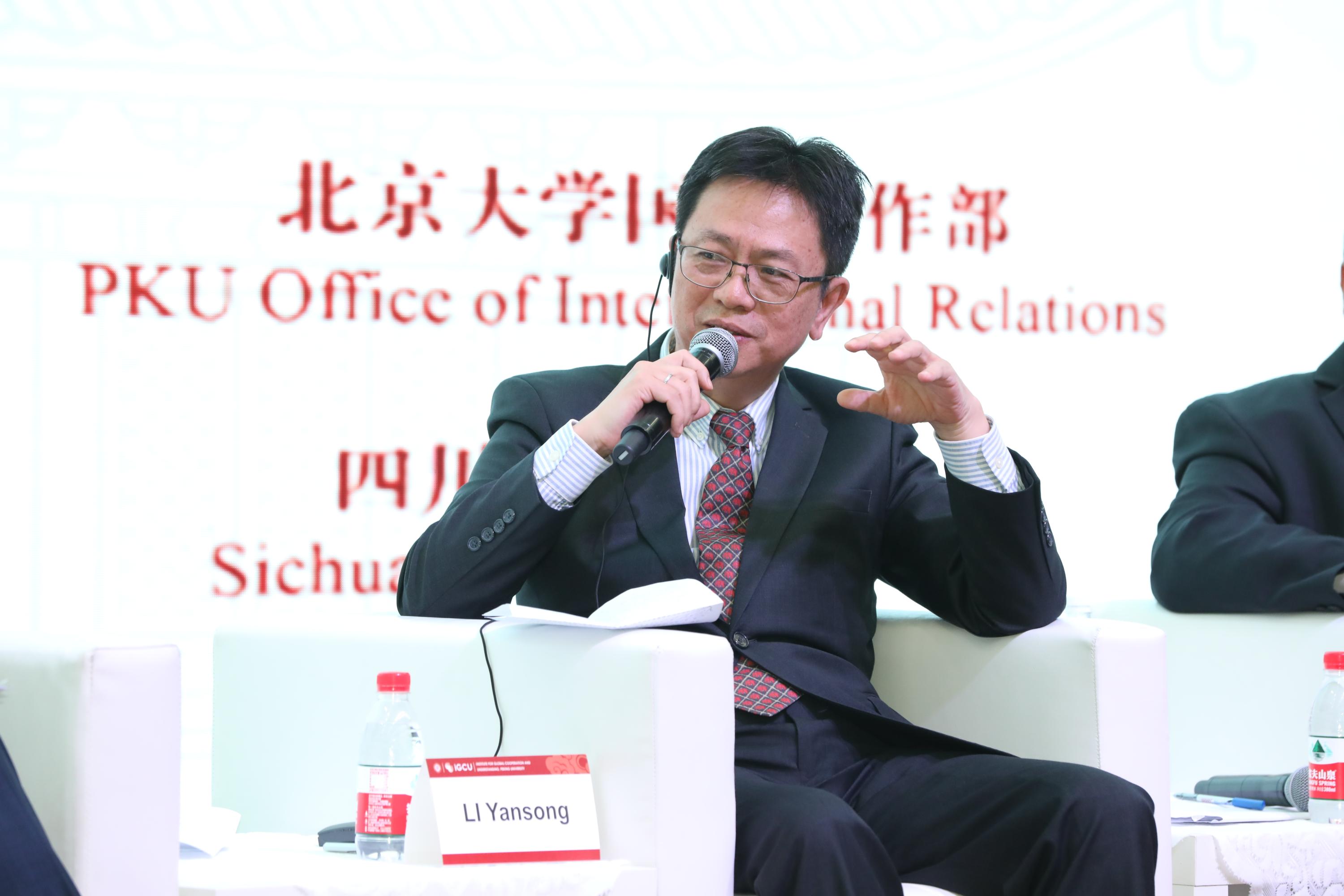
Prof. LI Yansong, President of Shanghai International Studies University
Prof. Ahmed Ragab Muhammad Ali (Vice President for Student Affairs of Cairo University) noted that all civilizations are closely intertwined, and it remains critical for us all to seek out what we share in common and better connect different civilizations. These efforts will eventually fast-track the universal values of humanity. Prof. Ragab Muhammad Ali also shared stories of promoting people-to-people exchange in light of his own experiences with Central Asian countries, summarizing that the basis of exchanges and cooperation between Egypt and Central Asian countries is people-oriented. He stated that although the countries on the Silk Road generally share different cultures and religions from one another, they share one core belief: we need to help each other, support each other, cooperate based on common values, and further emphasize the value of people-to-people exchange.
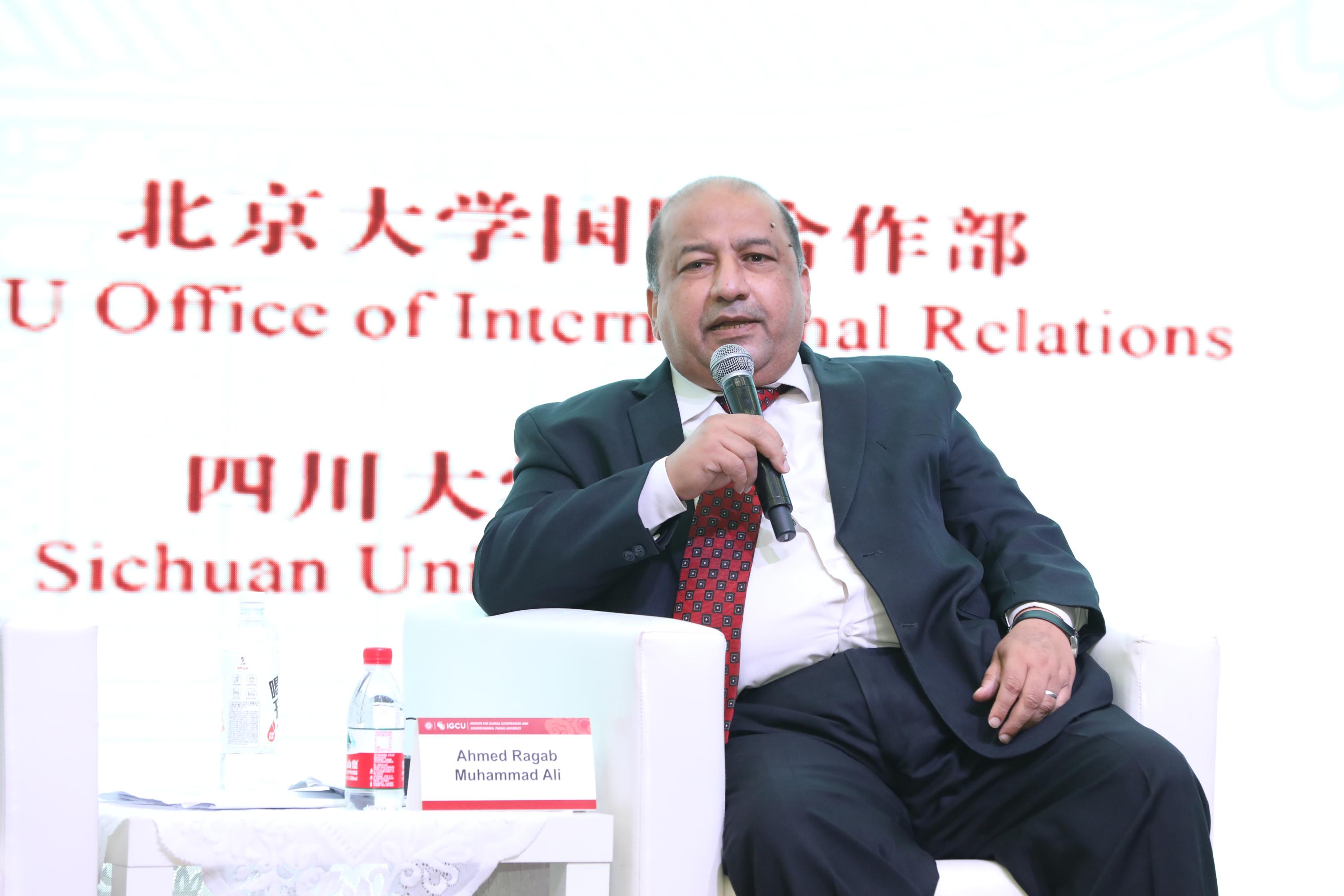
Prof. Ahmed Ragab Muhammad Ali, Vice President for Student Affairs of Cairo University, Egypt
Prof. WANG Bo (Vice President and Provost of Peking University, China) shared his understanding of people-to-people exchange in relation to the Chinese character "Bei Da" (Peking University). He explained that the pictograph for the Chinese character "北" (Bei, short for Beijing) looks like two "Ren" (people) standing back-to-back, one facing east and one facing west, which could be understood as the differences among civilizations. As for the other character, "大" (Da, short for University), it implies openness and tolerance. The two characters together, not only stand for Peking University in a literal sense but also coincide with the tenet and vision of Peking University, embodyingPKU'scommittmentto promote international people-to-people exchanges and mutual understanding and learning among universities. Prof. Wangalso gave three suggestions toyoungpeoplewho wish to pursue a career relevant to people-to-peopleexchanges: First, to effectively use your eyes to fully understand the world; use your ears well to listen to and accept different voices; use your heart well to maintain rationality and order of your inner self.
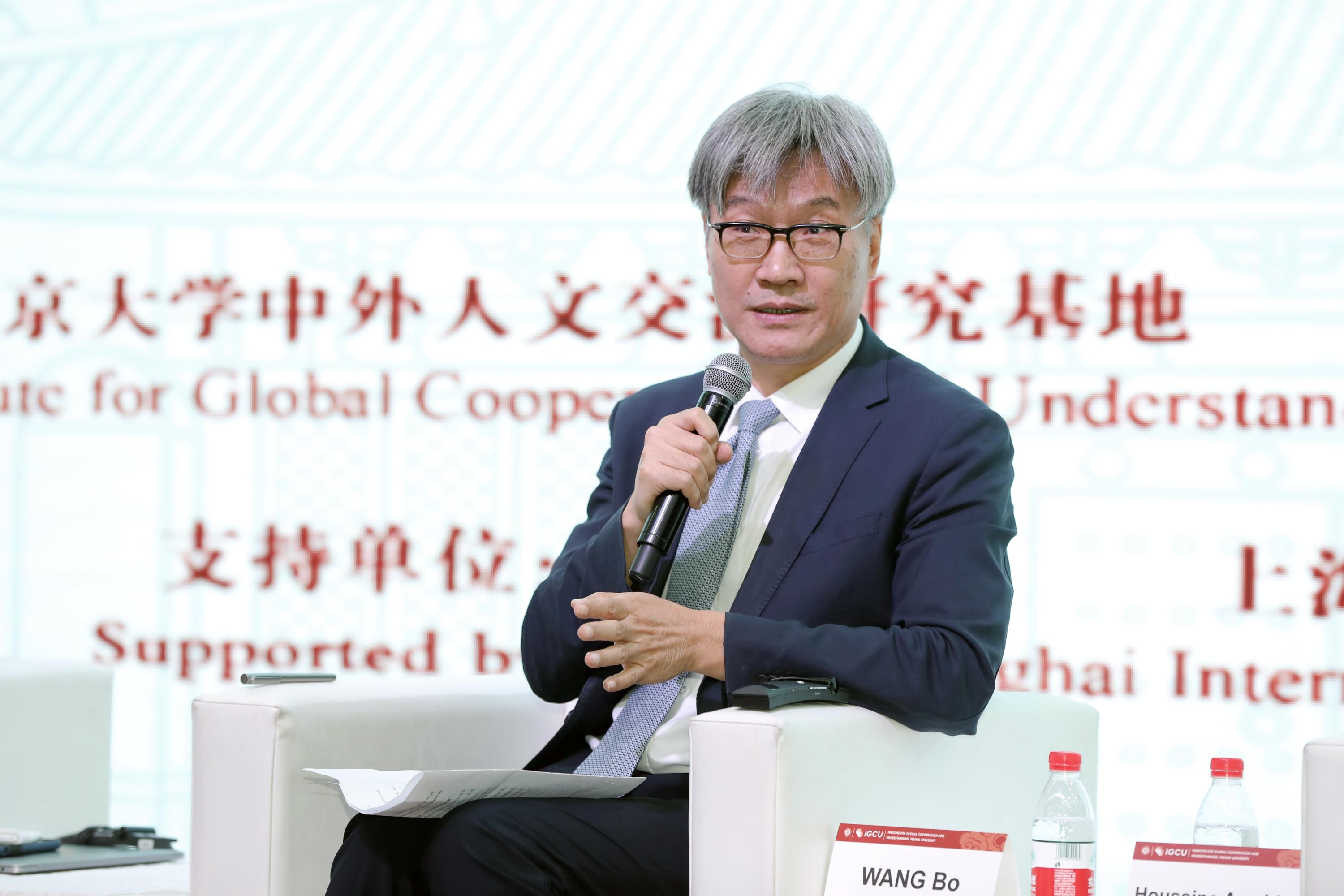
Prof. WANG Bo, Vice President and Provost of Peking University, China
Dr. Geoff E. Foy (Associate Provost for Graduate Programs and Continuing Education at Pacific Lutheran University, U.S.) noted that thePacific Lutheran University (PLU) emphasizes the importance of study-abroad opportunities for its students and faculty, about 50% of whom have been engaged in various international exchange experiences. It is the PLU’s vision that through these experiences, PLU students would learn diversified viewpoints and better understand the world. Talking about traditional Chinese culture and religions, Prof. Foy maintained that a noticeable difference exists in handling religious issues between Chinese and Western cultures. “Studying Chinese culture and that ability to respect allows us to have softened edges in Western culture and our understanding of our practice.” Prof. Foy suggested that ample room for mutual learning still exists between China and the West.
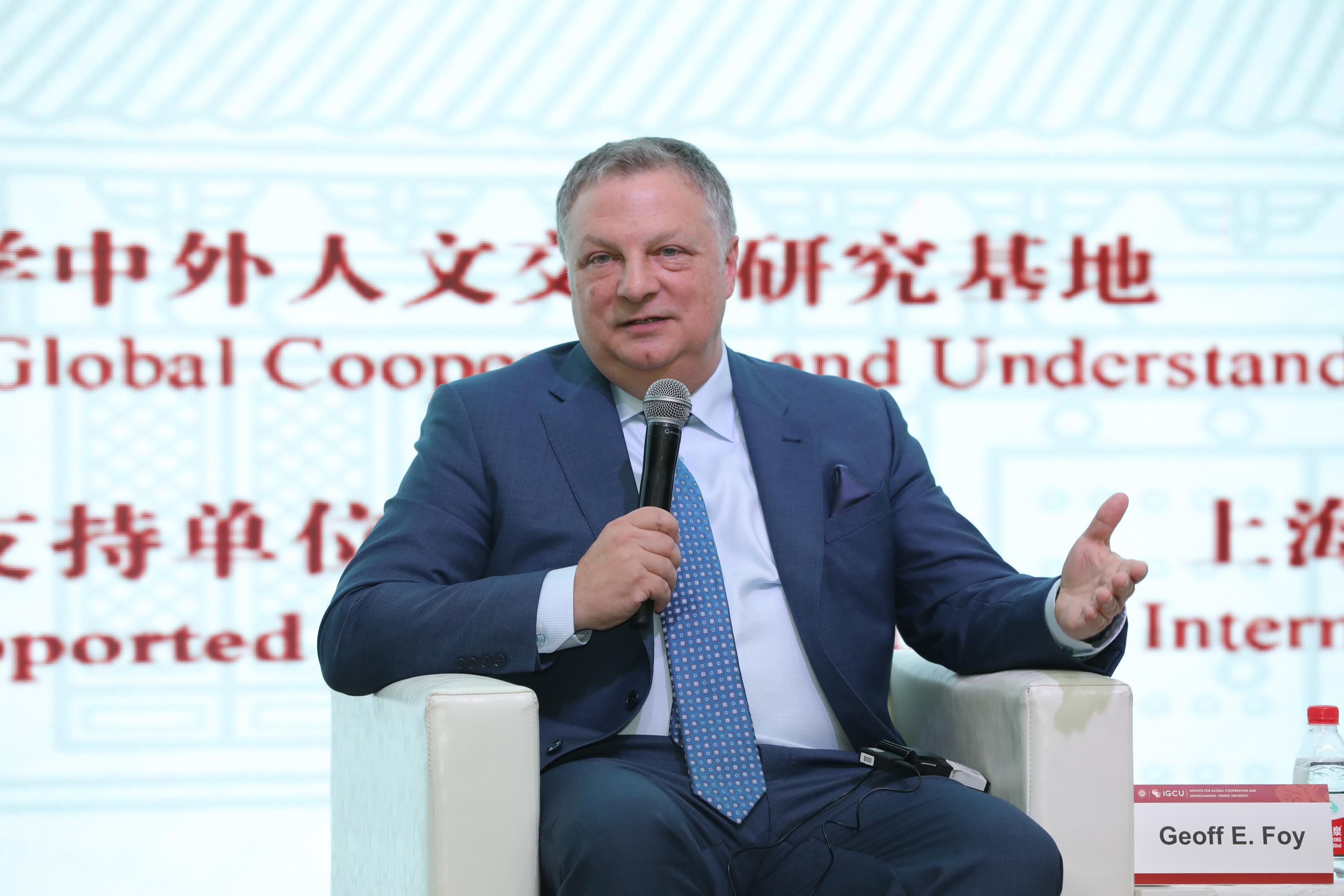
Dr. Geoff E. Foy, Associate Provost for Graduate Programs and Continuing Education at Pacific Lutheran University, U.S.
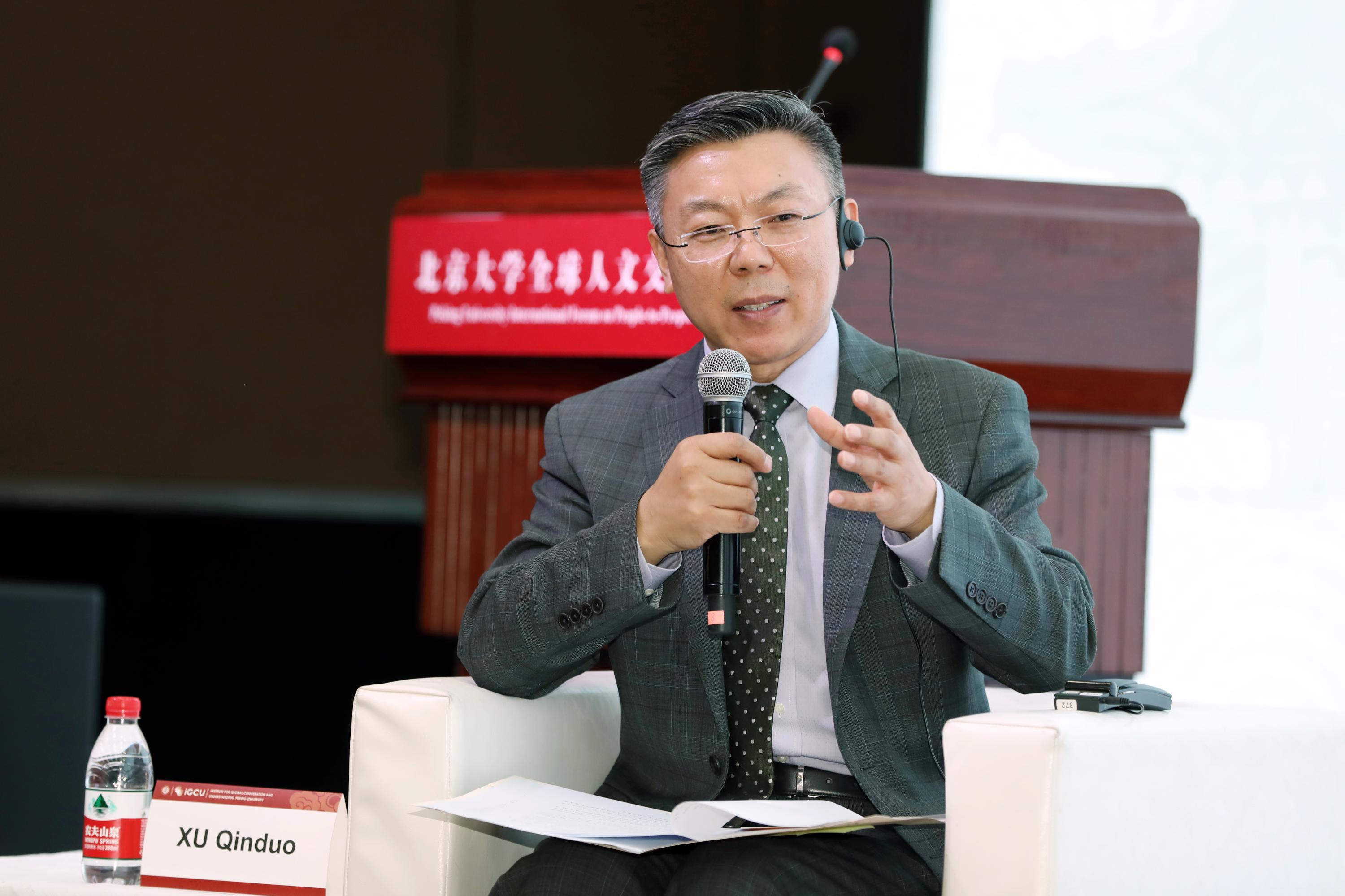
Mr. XU Qinduo, Anchor of CGTN
- Forum Session I -
The Forum Sessions I and took place on the same day at the Moonlight Hall of Yingjie Overseas Exchange Center (PKU), respectively themed "Profound Changes Unseen in a Century and People-to-People Exchanges" and "The Global Civilization Initiative: The Building of a Community with Shared Future for Mankind".
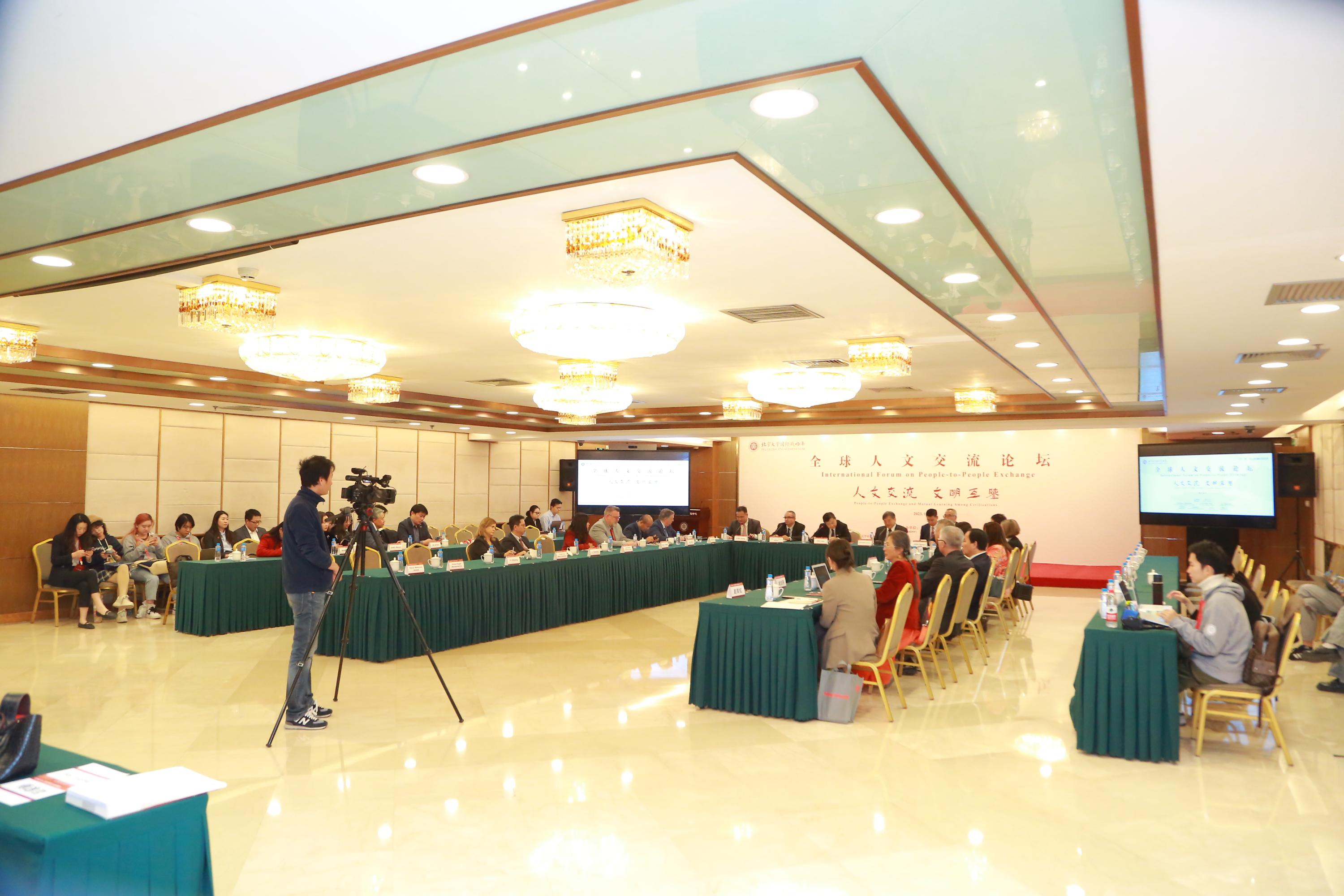
The first session was moderated by Prof. DONG Qiang (Dean of Yenching Academy, PKU). Prof. YAO Leye (Vice President of Sichuan University), Prof. Pasquale Mammone (President of the University of Artois, France), Prof. Watanabe Yoshihiro (Vice President of Waseda University, Japan), Prof. Juan José Ciruela Alférez (former Dean of the Confucius Institute at the University of Granada, Spain), and Prof. JIANG Wenguo (University Dean of International for China, Cardiff University, U.K.)participated in the event and delivered keynote speeches respectively.
Prof. YAO Leye (Vice President of Sichuan University) noted that since the beginning of civilizations, exchanges, and mutual learning have been an important part of human cultural life. The world today is undergoing major changes unseen in a century, with environmental, security, and other challenges increasingly crossing national borders. Only with unity and teamwork can we achieve common development amid uncertainties. Prof. Yao explained that Sichuan University is actively expanding channels for cross-cultural exchanges on three fronts: Among young individuals, within academic circles, and at the institutional level. The university aspires to create more platforms for cultural exchange, organize high-quality cultural exchange activities, and formulate and promote effective international communication strategies.
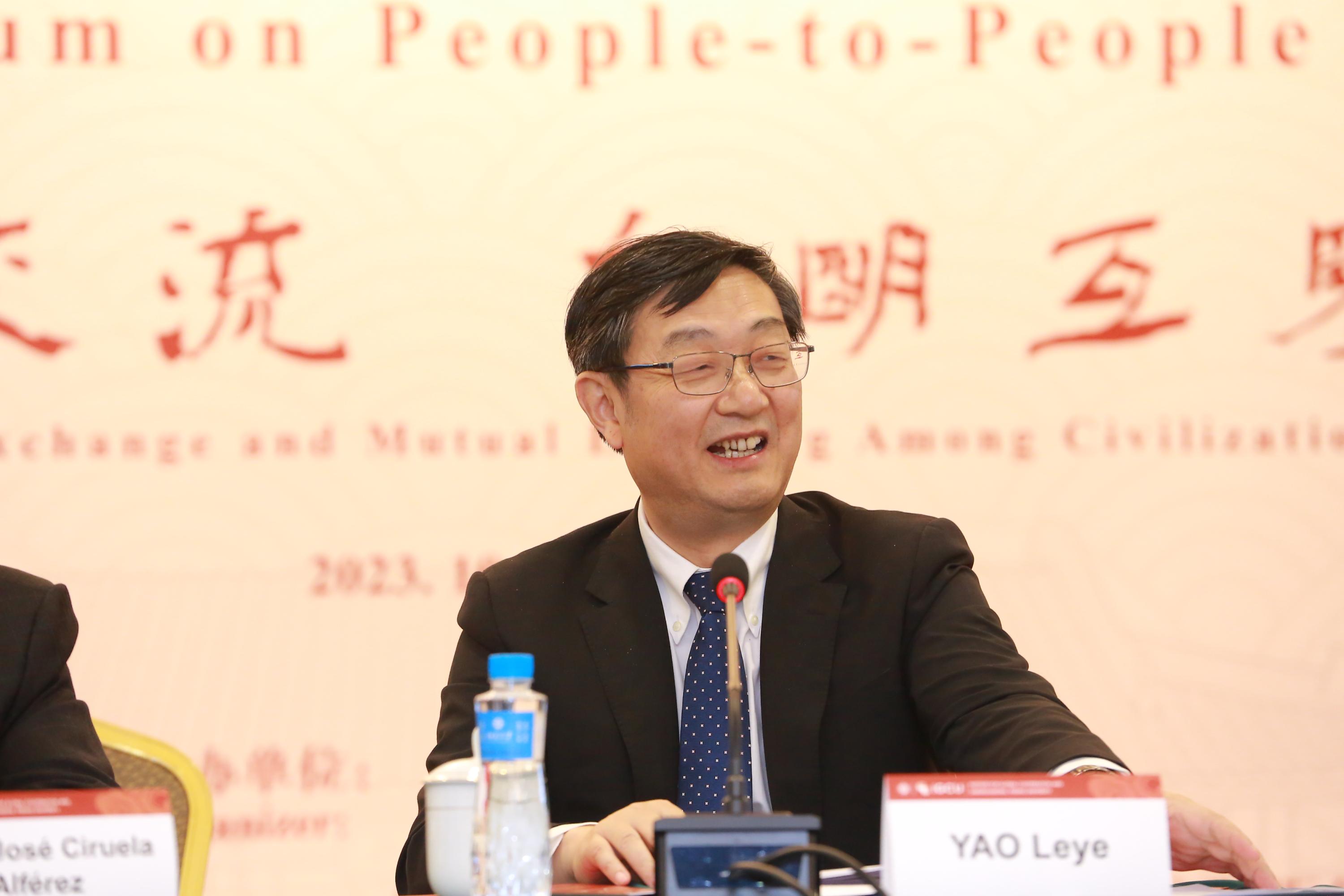
Prof. YAO Leye, Vice President of Sichuan University
Prof. Pasquale Mammone (President of the University of Artois, France) reviewed the collaborative history between Peking University and the University of Artois and summarized the partnership's ensuing fruitful results. Simultaneously, he emphasized the core concept of "cross-culturality" and analyzed its political and academic origins. He pointed out that cross-cultural research methods prioritize intercultural dialogue, striving to enrich cultural diversity rather than fostering cultural opposition. The collaboration between French and Chinese universities embodies the spirit of openness, cooperation, and progress. Universities from different countries need to advocate for mutual understanding in the realms of research, education, and culture, and contribute to the well-being of our society and the world.
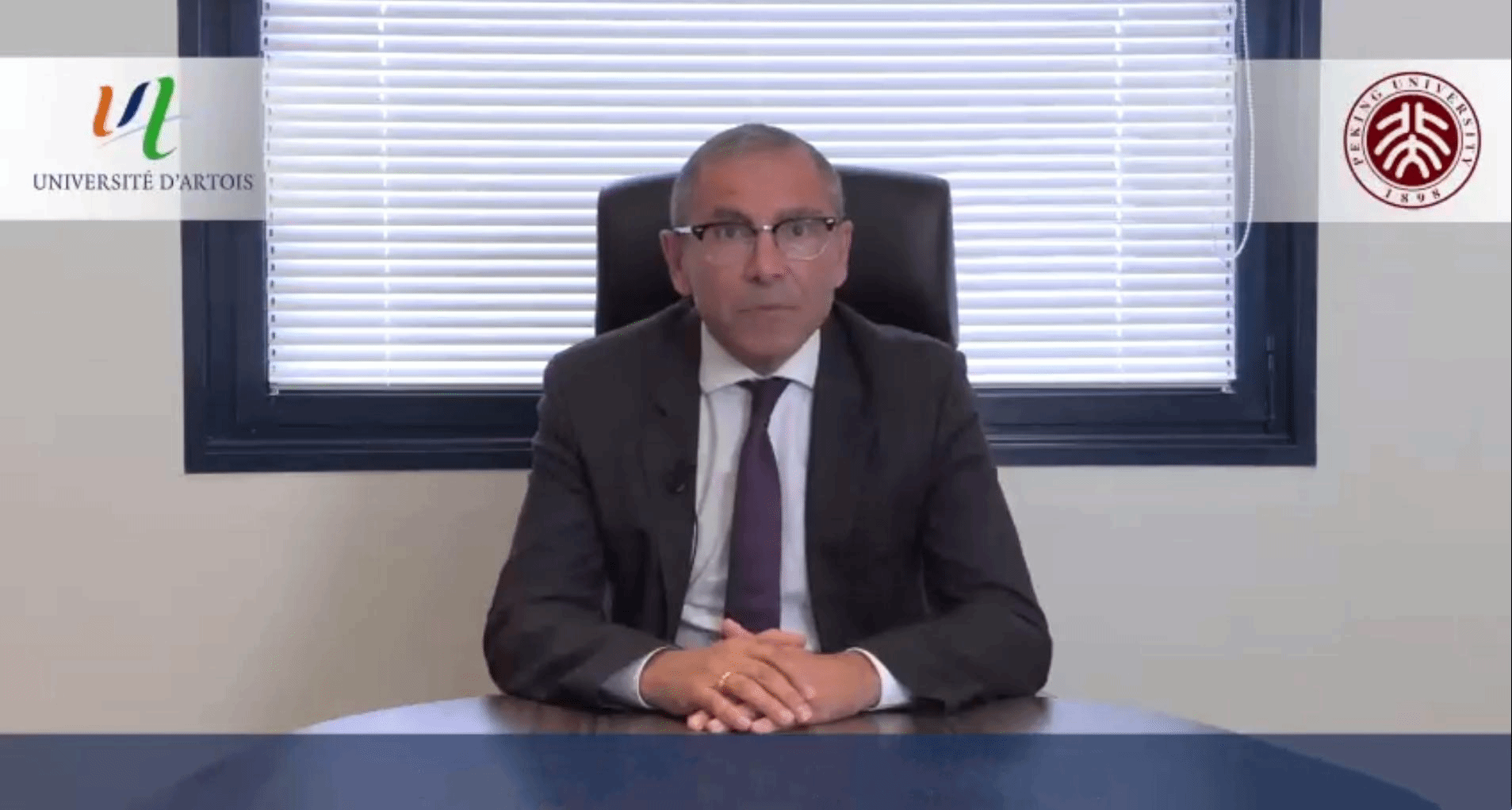
Prof. Pasquale Mammone, President of the University of Artois, France
Prof. Watanabe Yoshihiro (Vice President of Waseda University, Japan) recounted the historical trajectory of Sinology in Japan. He noted that although Sinology had been gradually marginalized in Japan with the progress of modernization, Waseda University has preserved the tradition of Sinology research. The university has welcomed a substantial number of Chinese international students who have played pivotal roles in disseminating Sinological knowledge and fostering stronger Sino-Japanese relations. Prof. Watanabe added that in light of these efforts and its dedication to Sinology, Waseda University expressed its intent to sustain collaborations with globally renowned academic institutions. Iteagerly anticipates partnering with Peking University to establish an international Sinology research center to nurture the next generation of leaders in the field of Sinology.
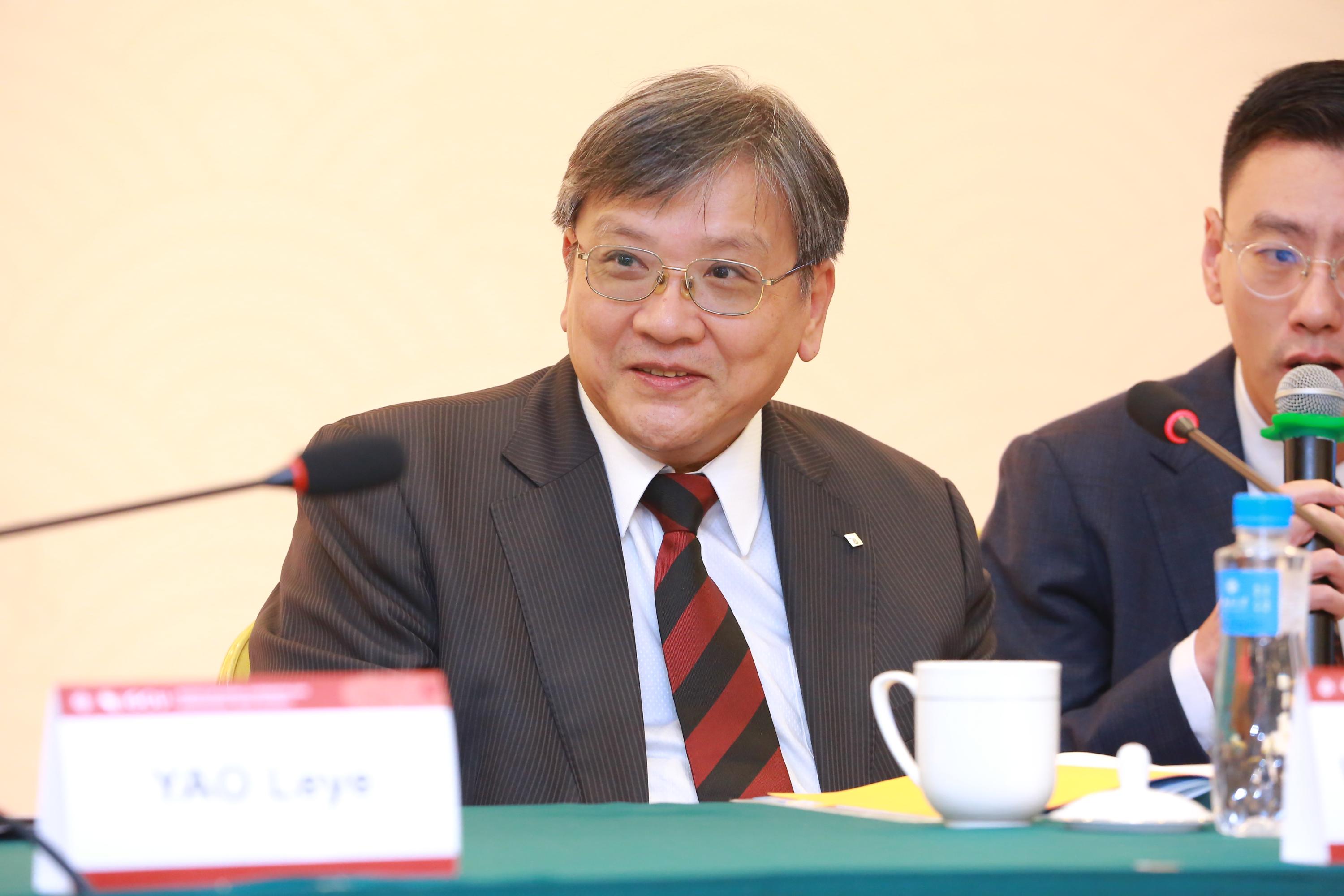
Prof. Watanabe Yoshihiro, Vice President of Waseda University, Japan
Prof. Juan José Ciruela Alférez (former Dean of the Confucius Institute at the University of Granada, Spain) expressed his honor to represent his institution at today's conference. He expressed gratitude to Peking University for providing the opportunity to share insights and gathering individuals from various countries to discuss the future of human development. He referenced the GDI Global Development Initiative, highlighting the importance of mutual respect among nations and underscoring the need for a more equitable environment with increased opportunities for development. He emphasized that no country can single-handedly address global challenges, noting the folly inherent in excluding others based on differences in culture. Instead, he stressed the importance of respecting the diversity of civilizations, emphasizing the unique value of Confucius Institutes in this regard.
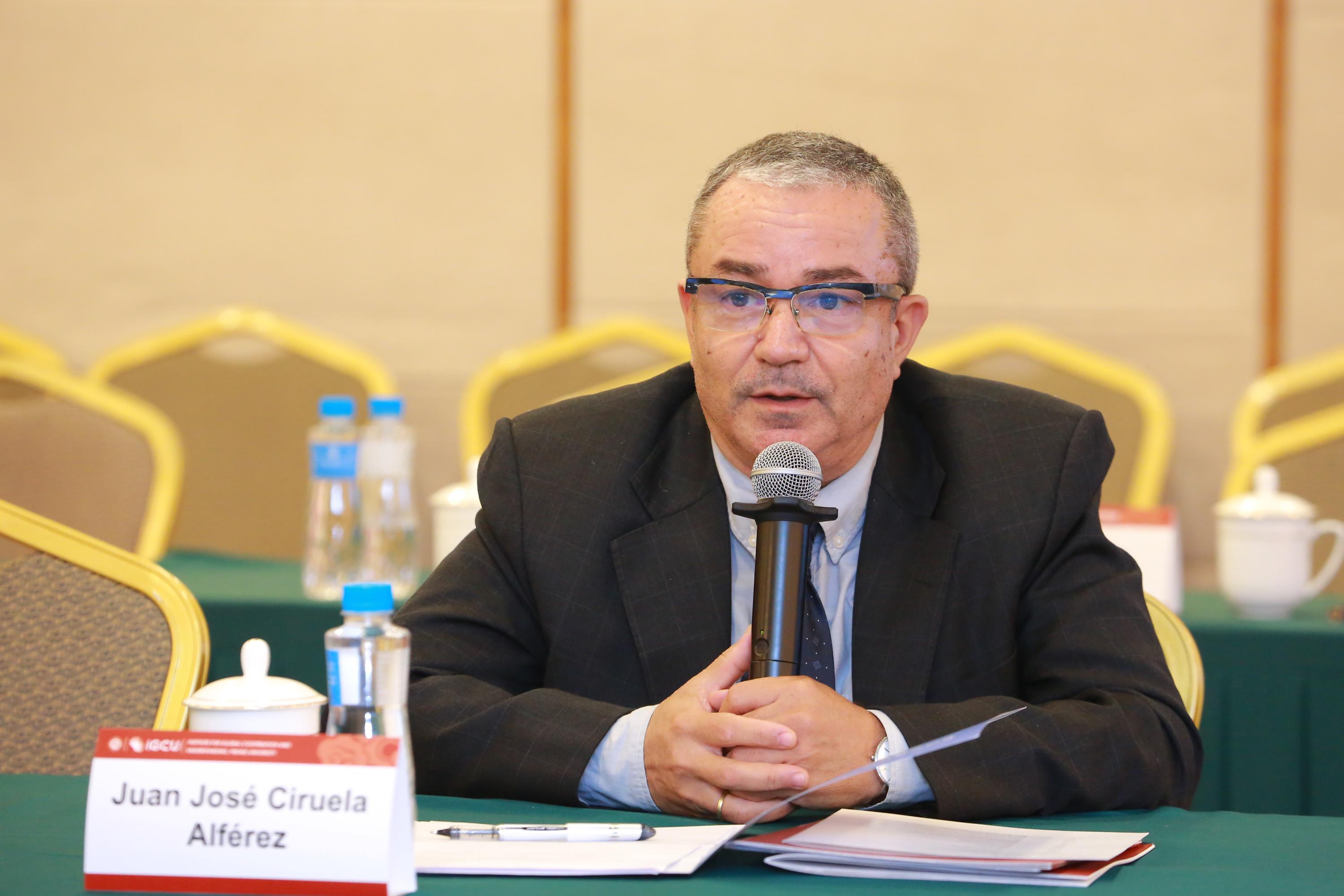
Prof. Juan José Ciruela Alférez, former Dean of the Confucius Institute at the University of Granada, Spain
Prof. JIANG Wenguo (University Dean of International for China, Cardiff University, U.K.) presented the global education efforts at Cardiff University. He indicated that Cardiff University currently hosts over 8,000 international students, with one-third of them hailing from China. They take pride in the highly internationalized educational environment. Prof. Jiang explained that Cardiff University established a close relationship with Peking University in 2013, initiating exchanges between faculty and students across both institutions. Cardiff University has also established joint training programs with Chinese institutions like Beijing Normal University, creating favorable conditions for mutual exchange between Chinese and British students. Beyond university exchanges, Cardiff University has expanded its repertoire of cross-cultural activities, including initiatives like Sino-UK Engineer Exchanges. Prof. Jiang believes that these initiatives have significantly enriched the people-to-people exchange between the two countries.
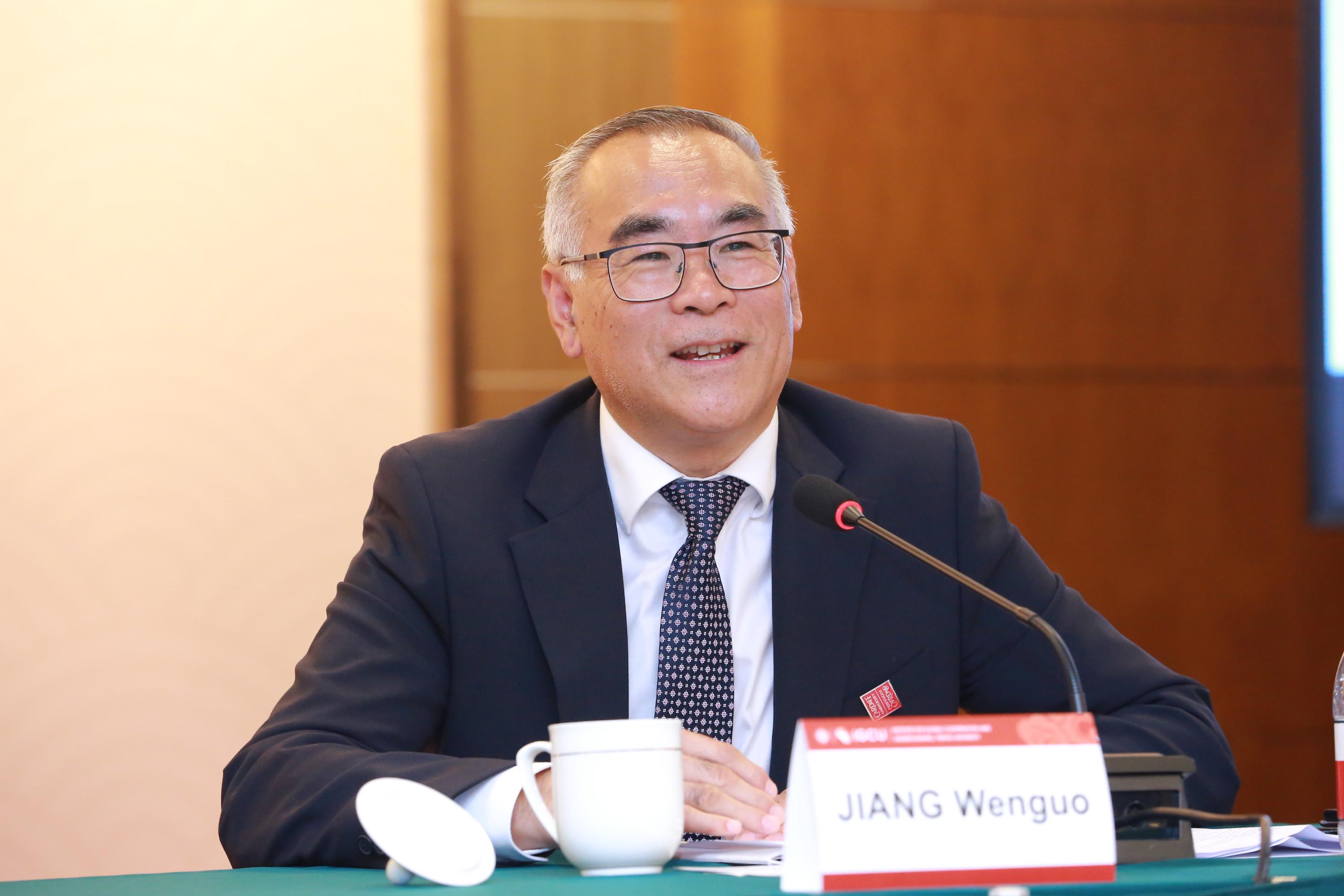
Prof. JIANG Wenguo, University Dean of International for China, Cardiff University, U.K.
Prof. Dong Qiang (Dean of Yenching Academy, PKU) pointed out the paramount importance of people-to-people exchanges in the context of great power strategic competition. He drew correlations between Yenching Academy, a China Studies master's program at Peking University, which hosts students from over 80 countries, and the Forum's guests, who are representatives from leading universities worldwide participating in discussions on cross-cultural interactions. Prof. Dong believes that these are great indications that people are coming together to make friends. He noted that China has made significant economic advancements in its previous stages of development, and the next step for China is to establish internationalized educational institutions that teach the Chinese language and promote Chinese culture. The hope is for success in the field of cultural exchange, and the Forum serves as a platform for these aspirations to be realized.
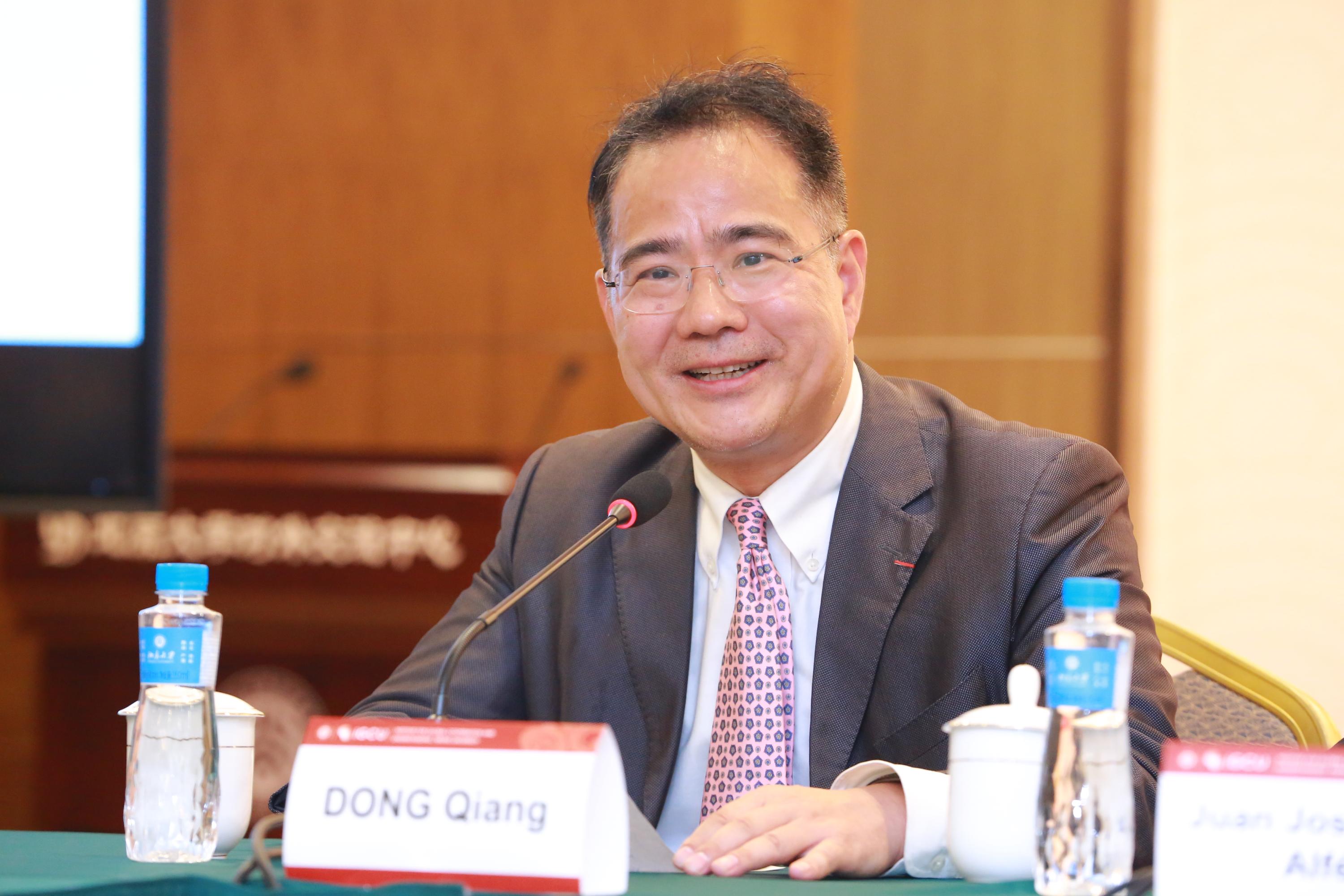
Prof. DONG Qiang, Dean of Yenching Academy, PKU
- Forum Session II -
The second session, hosted by Prof. Wang Dong (Executive Director of iGCU), invited world-renowned scholars to discuss the future development of human society. Keynote speakers included: Prof. Mustapha Lkhider (Vice President of Hassan II University of Casablanca, Morocco), Prof. Malcolm Butler (Vice President and Director of Global Engagement at the University of Sheffield, U.K.), Prof. Cristina del Mastro Vecchione (Vice President of Pontifical Catholic University of Peru), Prof. Rehab Mahmoud Ahmed (Professor of Cairo University, Egypt), and Prof. JIN Siyan (Professor and Director of the Confucius Institute at the University of Artois, France).
Prof. Mustapha Lkhider (Vice President of Hassan II University of Casablanca, Morocco) pointed out that international culture must transcend isolation, mutual learning should rise above confrontation, and cultural coexistence should transcend division. Achieving these visions hinges upon the vigorous promotion of people-to-people exchange and cooperation on a global scale. It also involves exploring the establishment of a global network for cross-civilizational dialogue and collaboration, enriching the depth of channels for international cooperation, and enhancing mutual understanding and friendship among nations. Prof. Mustapha stressed that Morocco, as a torchbearer for cross-cultural dialogue within the framework of the global civilization initiative, hosted the ninth United Nations Alliance of Civilizations Global Forum (UNAOC). He underscored this action as a shining example of promoting dialogue, understanding, and cooperation across different cultures.
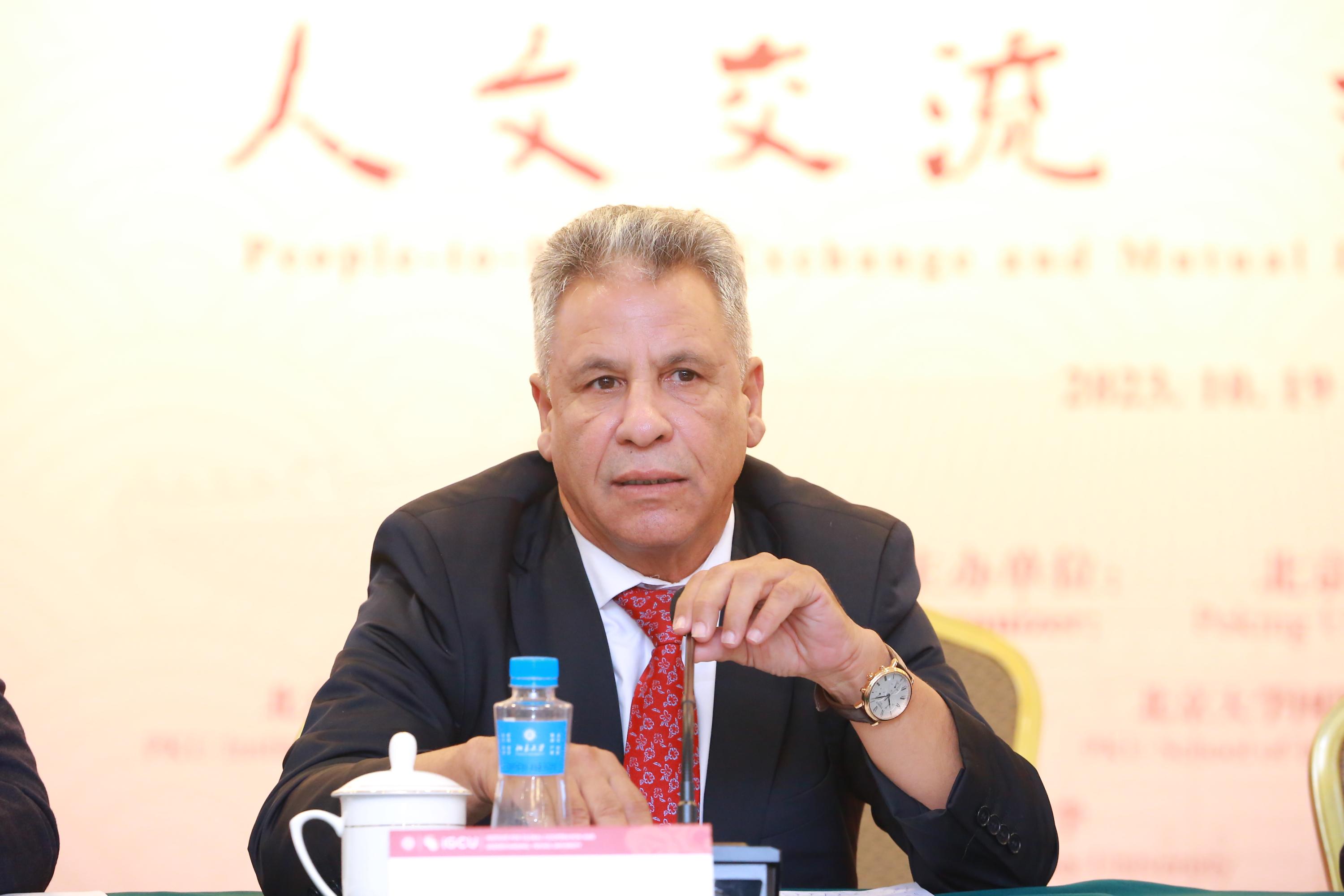
Prof. Mustapha Lkhider, Vice President of Hassan II University of Casablanca, Morocco
Prof.Malcolm Butler (Vice President and Director of Global Engagement at the University of Sheffield, U.K.) noted that to address the most pressing global challenges today, countries must adopt solutions on a global scale, sharing knowledge, resources, and expertise for the common interests of people worldwide. No single university can individually solve these complex problems. It is time to increase collaboration among global institutions of higher learning. Also, interdisciplinary cooperation across borders will lead to new academic discoveries that will greatly contribute to solving global issues. He pointed out that the University of Sheffield has a historical tradition of fostering interactions and exchanges among scholars from diverse backgrounds. Besides, he reckoned that the Forum and the "People-to-people Exchange and Mutual Learning Among Civilizations" series will also bring together different cultures and ideas to enrich and expand our knowledge. He also expressed hope to continue collaborating with Peking University in promoting various innovative cultural projects in the future.
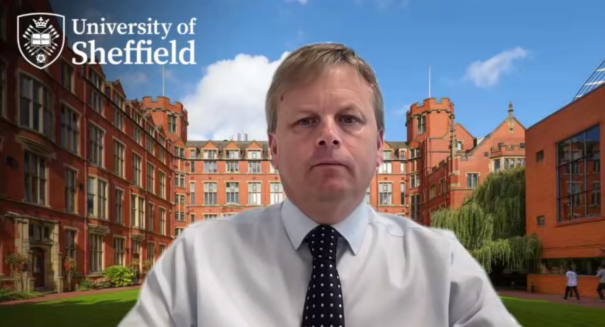
Prof.Malcolm Butler, Vice President and Director of Global Engagement at the University of Sheffield, U.K.
Prof. Cristina del Mastro Vecchione (Vice President of the Pontifical Catholic University of Peru) believes that humanity is in an unprecedented era of change, as the 21st century has brought a series of complex challenges closely tied to globalization. These issues continue to alter the ways cultures, economies, and technologies interact around the world. Prof. Cristina explained that these challenges require international cooperation and trust among nations and civilizations. The long history of cultural exchange between Peru and China can contribute to mutual understanding, tolerance, respect, and appreciation of cultural diversity. Therefore, universities need to play a vital role in people-to-people exchange, employing their wisdom to propose solutions, gather initiatives, and build bridges for dialogue and cooperation between nations.
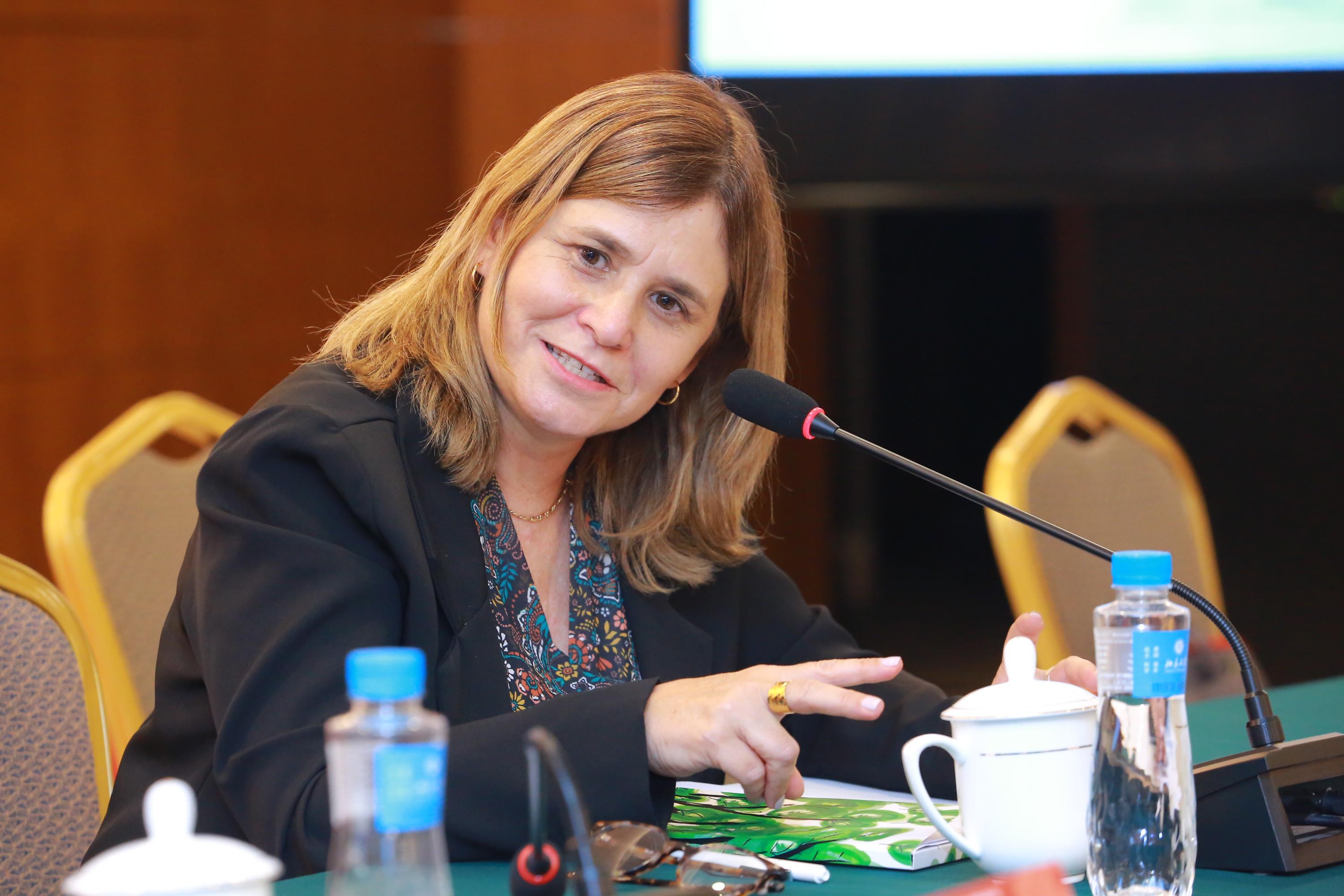
Prof. Cristina del Mastro Vecchione, Vice President of Pontifical CatholicUniversity of Peru
Prof. Rehab Mahmoud Ahmed (Professor at Cairo University, Egypt) commented that with the advancement of technology, interactions between people have become increasingly frequent, creating conditions for broader people-to-people exchanges. China focuses on common interests and values among nations to collectively address global crises through economic and cultural exchanges. Prof. Rehab noted that the function of universities is to facilitate the dissemination of knowledge, cultural exchange, and mutual understanding. Therefore, institutions like Confucius Institutes should be utilized as platforms for intercultural dialogue, helping foreigners gain a deeper understanding of China.
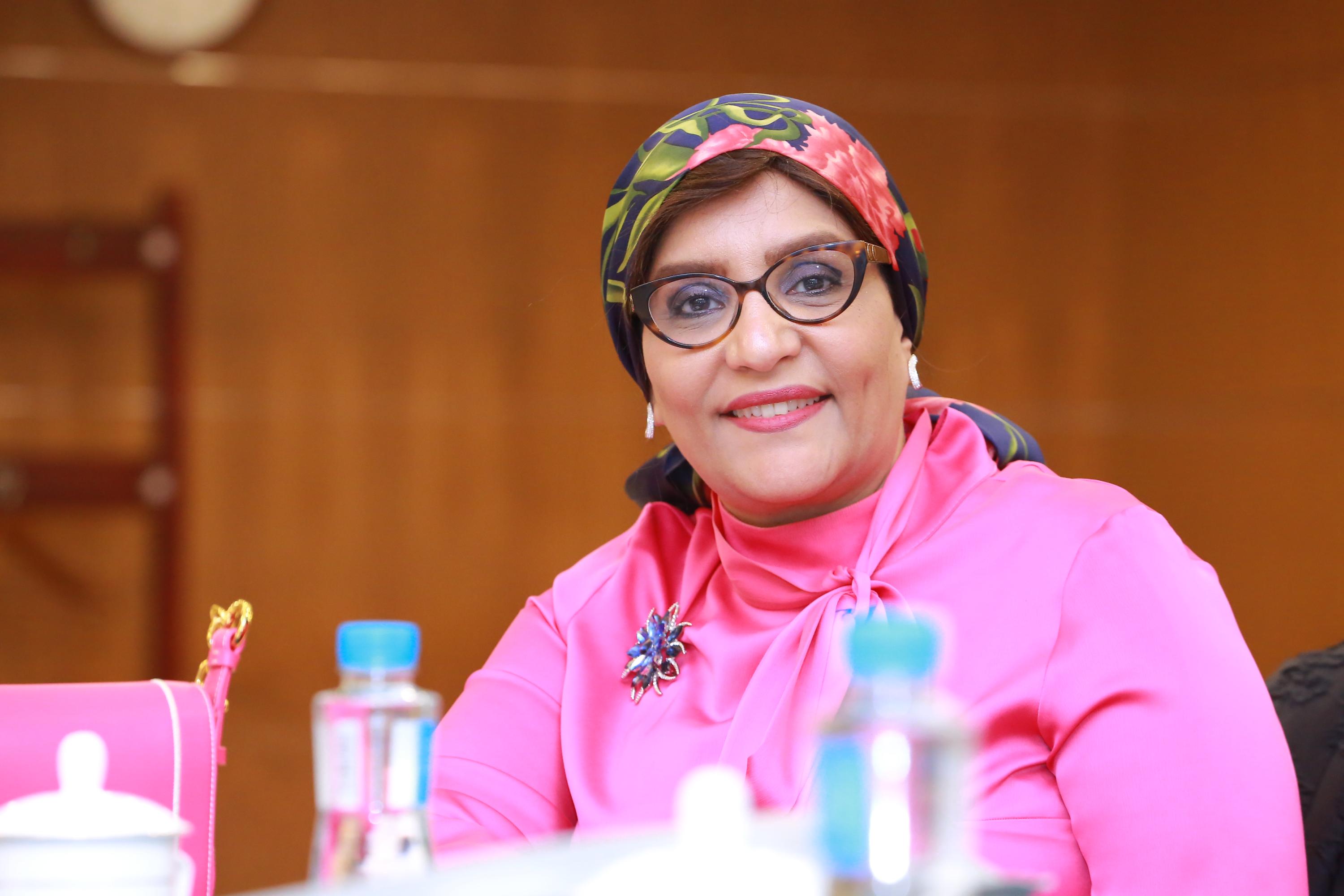
Prof. Rehab Mahmoud Ahmed, Professor of Cairo University, Egypt
Prof. Jin Siyan (Professor and Director of the Confucius Institute at the University of Artois, France) introduced the development of cross-cultural studies in China from the context of the interaction between Chinese and Western cultures. She analyzed three encounters between China and the Western world, categorizing them into two models: "The culture of endurance" and "the culture of choices." In 2016, "Intercultural Studies" were officially established in China, with twenty-one disciplines engaged in its development, significantly expanding its research scope. Prof. Jin also pointed out that cross-cultural researchers need a comprehensive perspective, sufficient patience, and meticulous attention to detail.
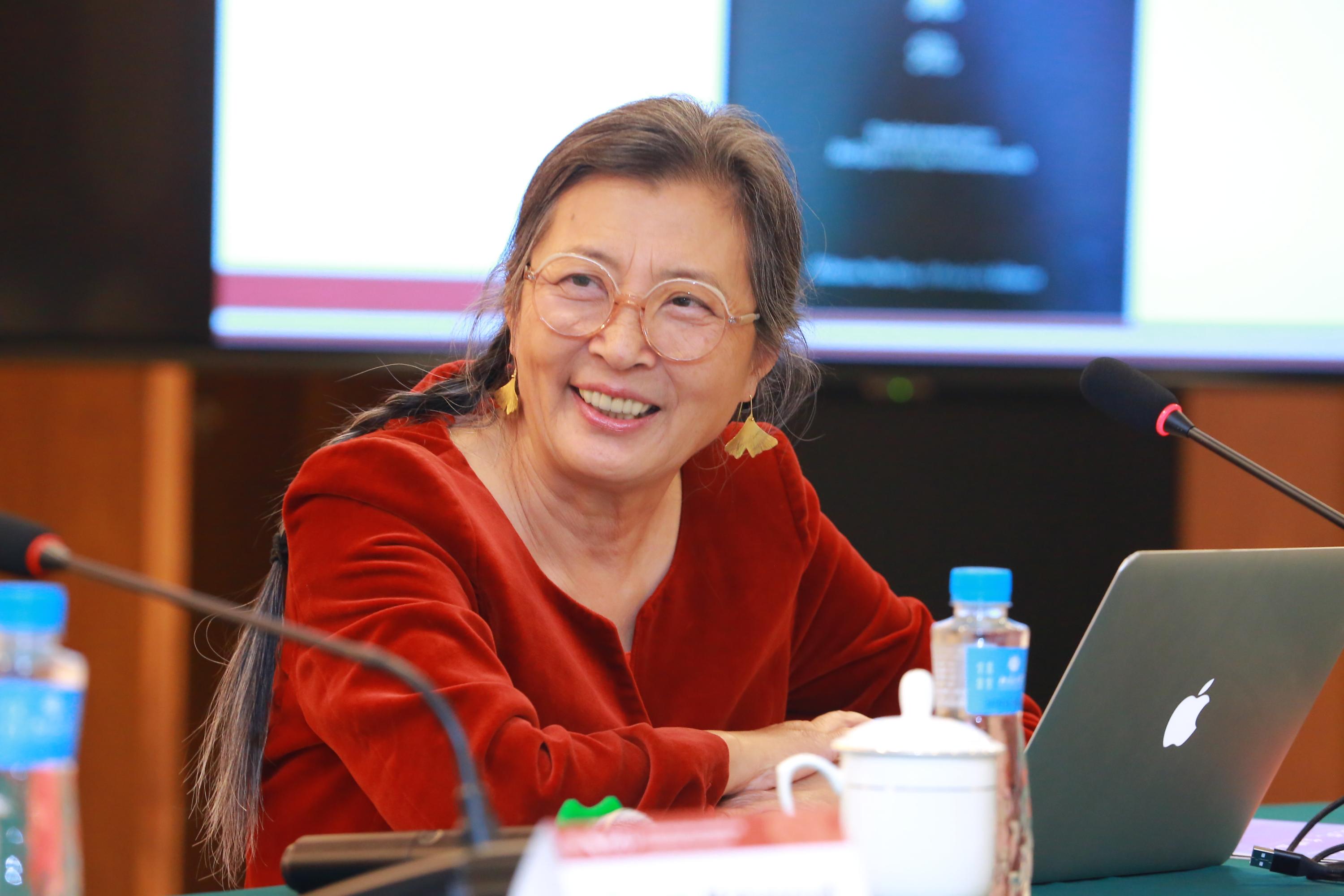
Prof. JIN Siyan, Professor and Director of the Confucius Institute at the University of Artois, France
During the discussion, participants shared their most memorable transnational or cultural activities. Prof. Jin recounted her story in Sino-France cross-cultural research, while Prof. Vecchionere called her connection with China. Participants heatedly discussed young people's role in promoting people-to-people exchange and approaches to advance their participation in cross-cultural communication.
At the end of the discussion session, Prof. Wang Dong (Professor at SIS; Executive Director of iGCU) suggested that the youth should and would play significant roles in people-to-people exchange for the future of humanity. He also encouraged several students in the audience to share their thoughts on people-to-people exchanges. Prof. Wang proposed that all the distinguished guests and scholars should continue to work together and make the International Forum on People-to-People Exchange an important platform for students across the world to communicate and learn from one another.
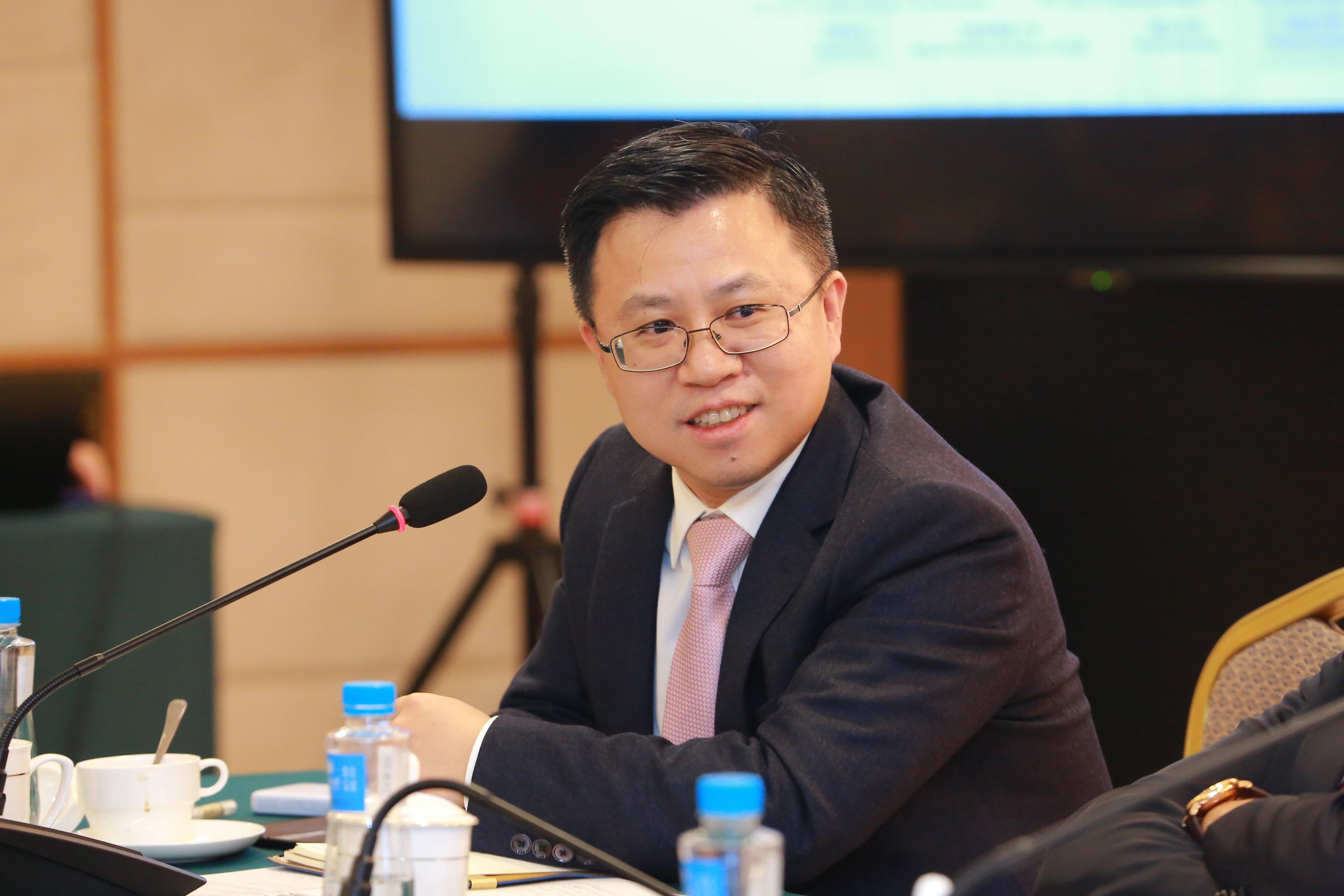
Prof. Wang Dong, Professor at SIS and Executive Director of iGCU
The International Forum on People-to-People Exchange and Launch Ceremony of the Global People-to-People ExchangeSeason of Peking University is also one of the essential events of the PKU Global Engagement Year. Through the global people-to-people exchange and open and innovative international cooperation, PKU and all its partner universities from all over the globe are determined to promote the joint construction of a global cultural community. This is in line to play their part in facilitating and enhancing people-to-people exchange and contributing to the development and progress of human civilization.
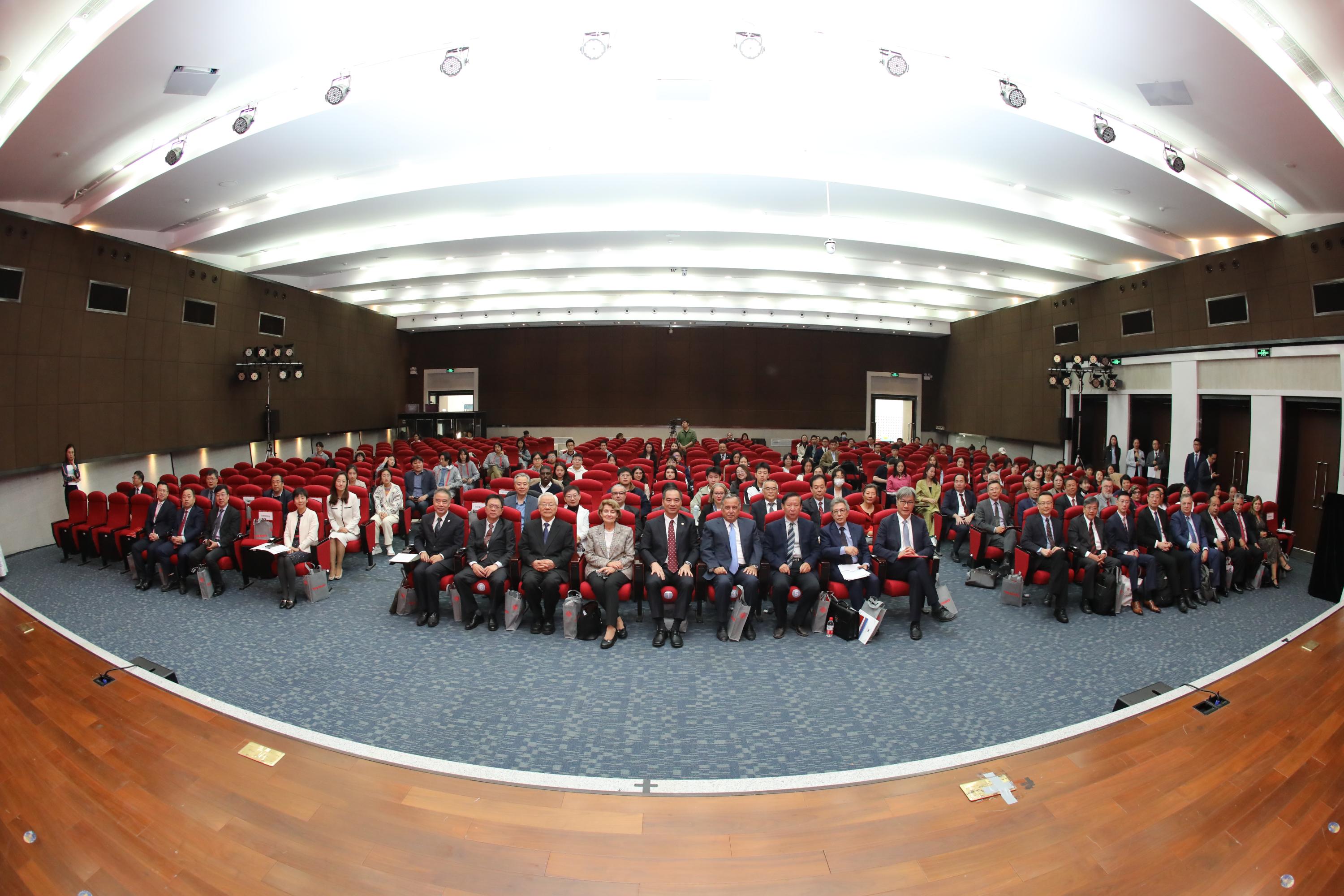
Group Photo
